Special Report
States Where It’s Easiest (and Most Difficult) to Donate Blood
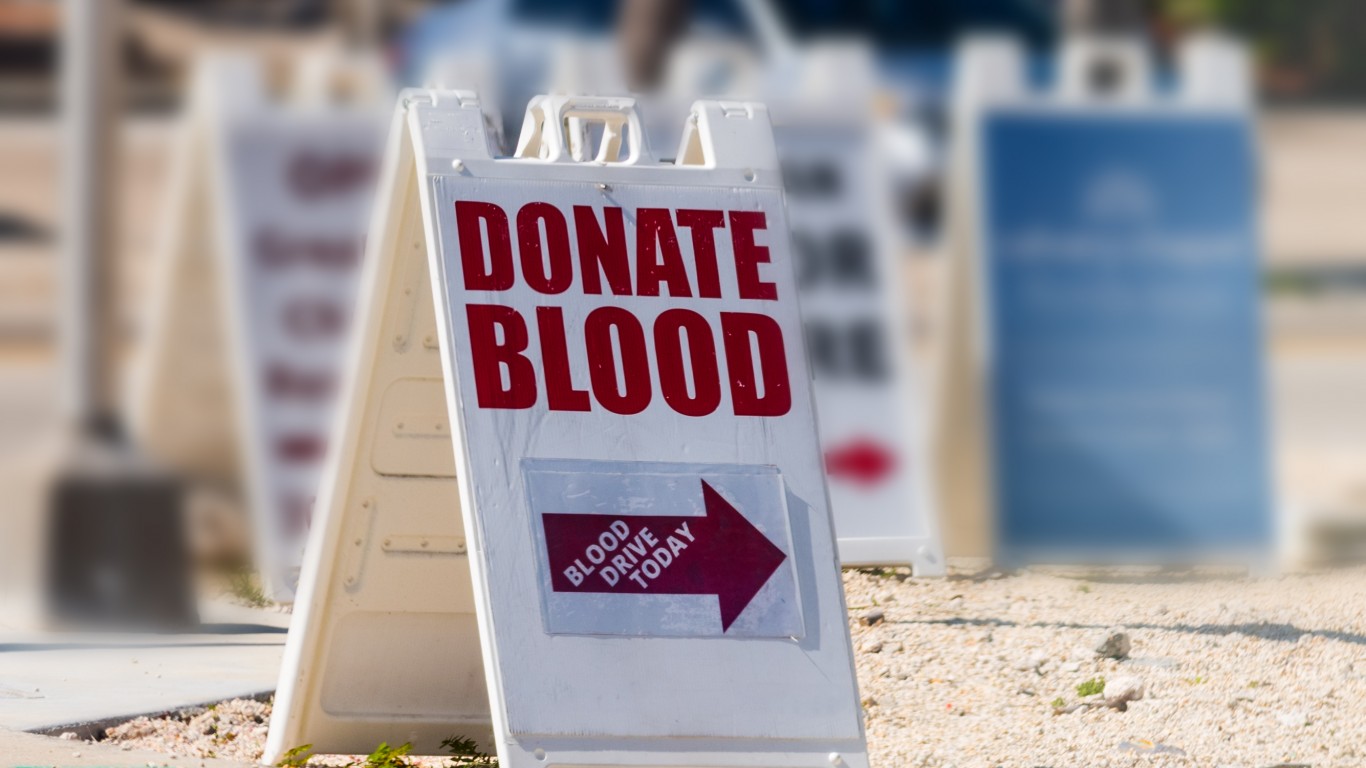
Published:
Last Updated:

The United States faces a chronic blood shortage. While about 37% of the population is eligible to donate blood, only less than 10% do. The Red Cross periodically issues urgent calls for blood donors.
Every day, about 36,000 units of red blood cells are needed in the U.S., and every two seconds someone, somewhere in the country, needs blood. Around 4.5 million Americans would die every year if blood wasn’t available for life-saving transfusions.
24/7 Tempo reviewed the number of active blood donation centers registered on the Food and Drug Administration’s website in each state to identify the states where it’s easier to donate blood.
More populous states tend to have more blood donation centers — yet not necessarily enough facilities for the population. For example, California has 200 locations, the third most locations of all states, but considering the state’s largest population, it only has about five facilities per 1 million people, one of the worst concentrations. Similarly, Texas, Illinois, and New York, which are among the states with the most facilities in the country, don’t even make the top 20 of states where it’s easier to donate blood when ranked on a per capita basis.
One unit of blood is approximately 525 ml, or about 1 pint, and just 1 pint is enough to save as many as three lives. Hospitals are often in short supply of type O blood — the universal red cell donor can be given to people with all other blood types, which is why it’s used in emergencies.
Most people are eligible to donate blood, but a few restrictions apply: A person needs to weigh at least 110 pounds, be in generally good health, and be at least 16 years old in most states. Certain conditions can also disqualify potential donors. These include having had hepatitis B or C, being HIV positive, having been in Europe for a total of five years after 1980, and having traveled in the past year to places where some diseases are endemic.
Donating blood may be a good way not only to help someone else, but also to check one’s own health. All donated blood is tested for certain serious infections such as HIV and bacterial contamination. A blood test, of course, can reveal a lot more — here are 50 dangerous conditions testing your blood can detect.
Click here for the states where it’s easiest and most difficult to donate blood.
Methodology
To determine the states where it is easiest to donate blood, 24/7 Tempo reviewed the number of active blood donation centers registered on the U.S. Food and Drug Administration’s website in each state. Most blood centers rely heavily on mobile drives in addition to their fixed sites, so the geographic reach within their states is significantly higher. State population figures come from the U.S. Census Bureau’s 2018 estimates of the resident population.

50. Connecticut
> Facilities per million residents: 4.48
> FDA-registered active blood centers: 16
> City with most blood center locations: New Haven (2)
> Blood center with most locations American Red Cross (2) and Yale New Haven Hospital (2)
> Population: 3,572,665
[in-text-ad]
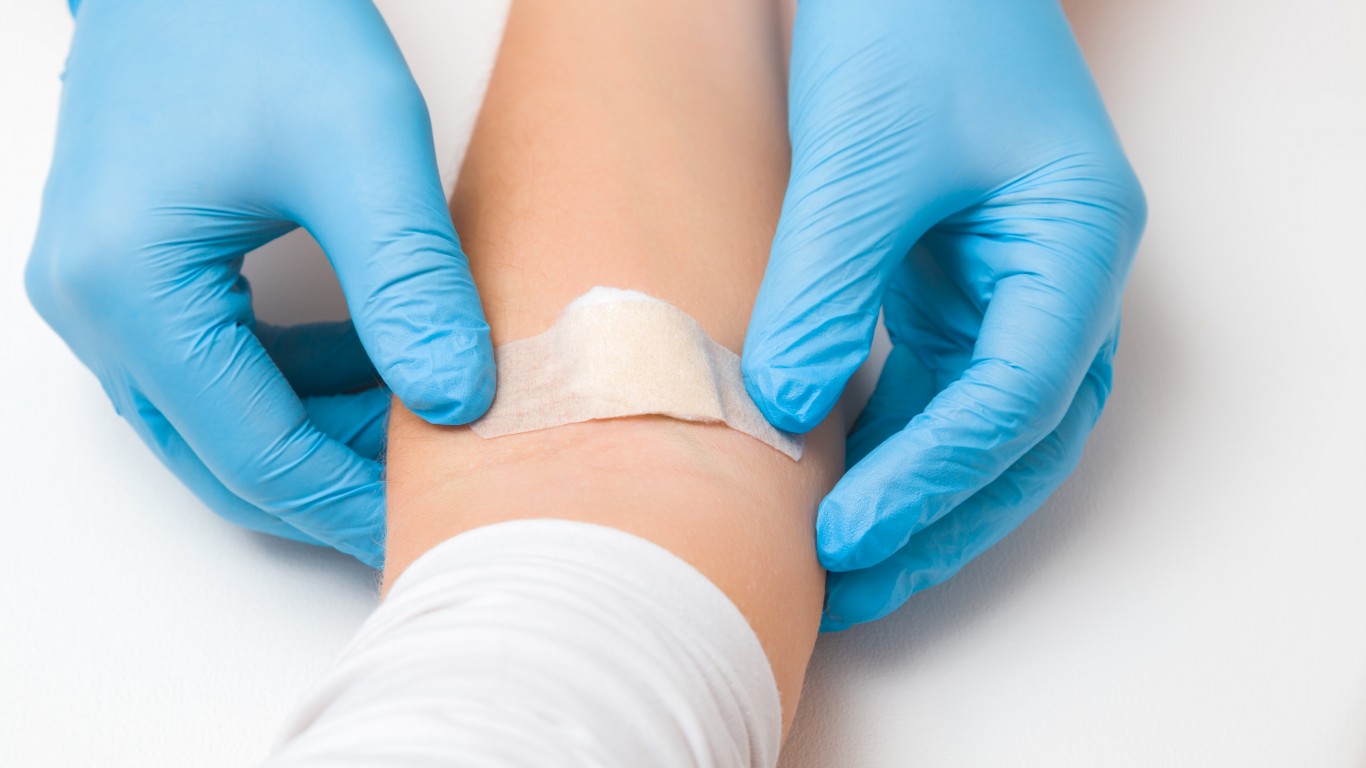
49. New Jersey
> Facilities per million residents: 4.71
> FDA-registered active blood centers: 42
> City with most blood center locations: New Brunswick (5)
> Blood center with most locations Bergen Community Regional Blood Center (5)
> Population: 8,908,520
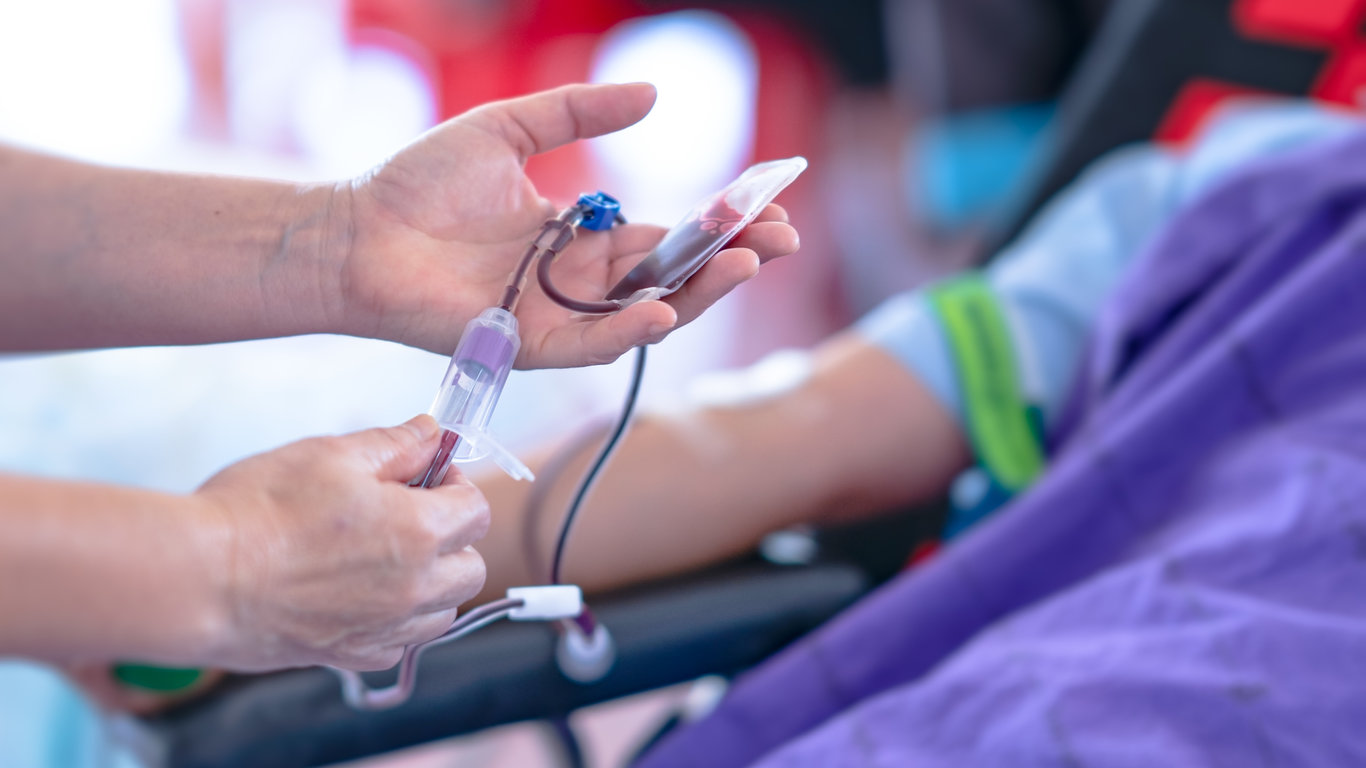
48. Vermont
> Facilities per million residents: 4.79
> FDA-registered active blood centers: 3
> City with most blood center locations: Burlington (2)
> Blood center with most locations American National Red Cross (1), University of Vermont Medical Center (1) and Veterans Admin. Medical & Regional Office Ctr. (1)
> Population: 626,299
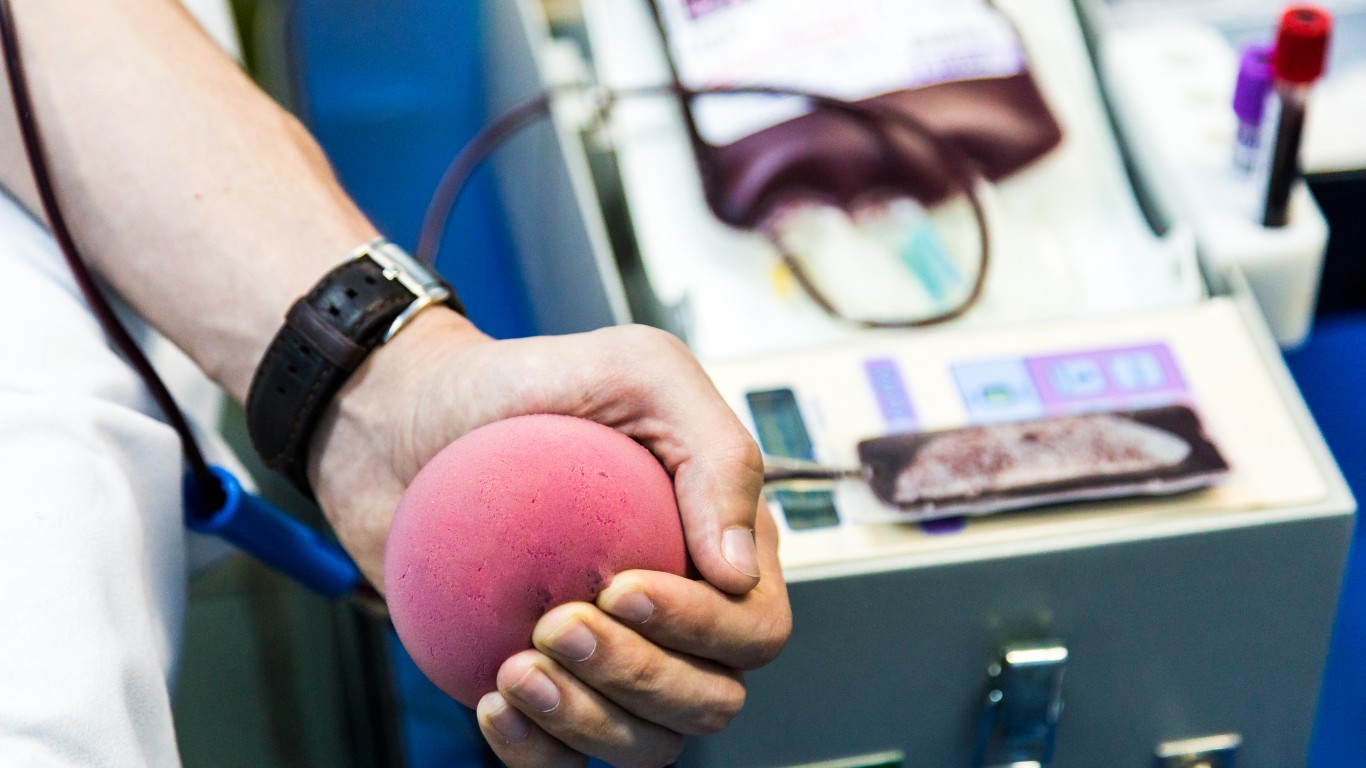
47. California
> Facilities per million residents: 5.06
> FDA-registered active blood centers: 200
> City with most blood center locations: Los Angeles (14)
> Blood center with most locations Vitalant (27)
> Population: 39,557,045
[in-text-ad-2]
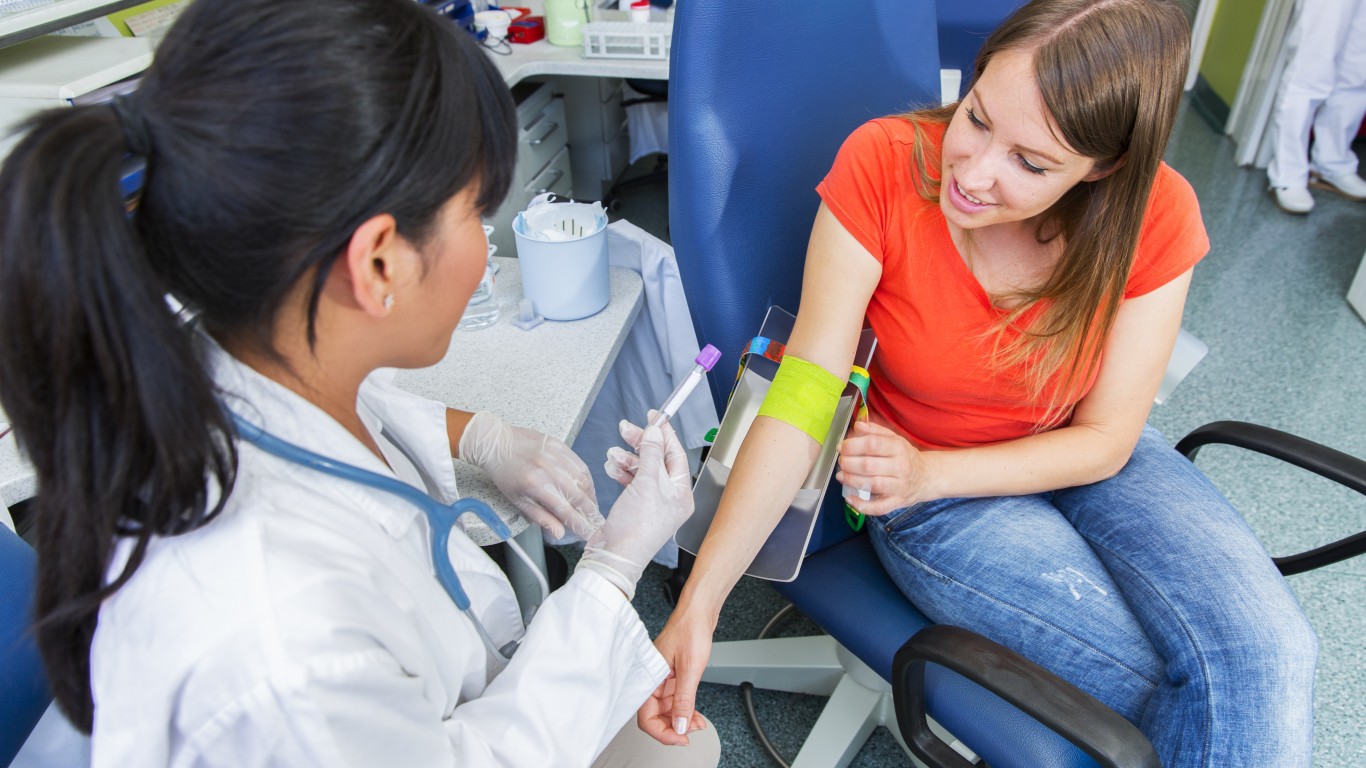
46. New York
> Facilities per million residents: 5.12
> FDA-registered active blood centers: 100
> City with most blood center locations: New York City (16)
> Blood center with most locations New York Blood Center, Inc. (15)
> Population: 19,542,209
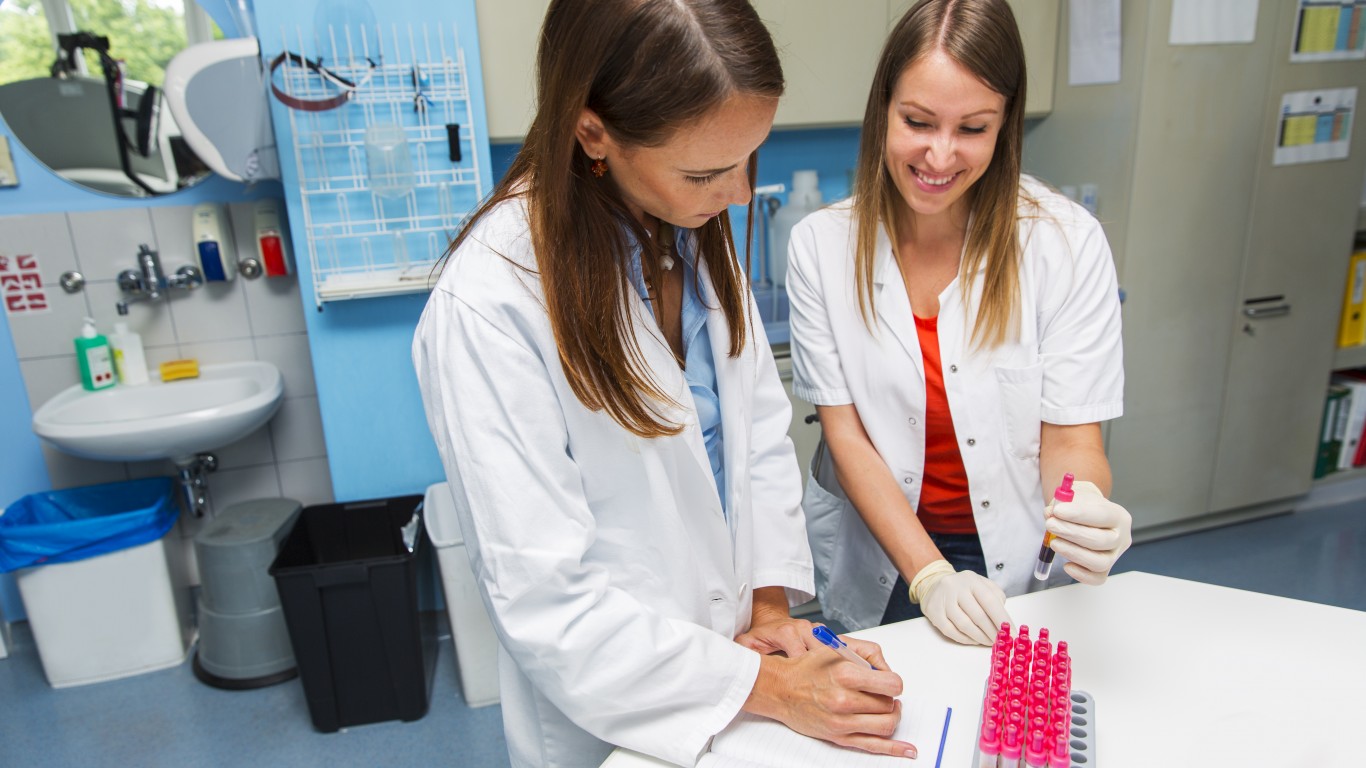
45. Massachusetts
> Facilities per million residents: 5.22
> FDA-registered active blood centers: 36
> City with most blood center locations: Boston (7)
> Blood center with most locations American National Red Cross (7)
> Population: 6,902,149
[in-text-ad]
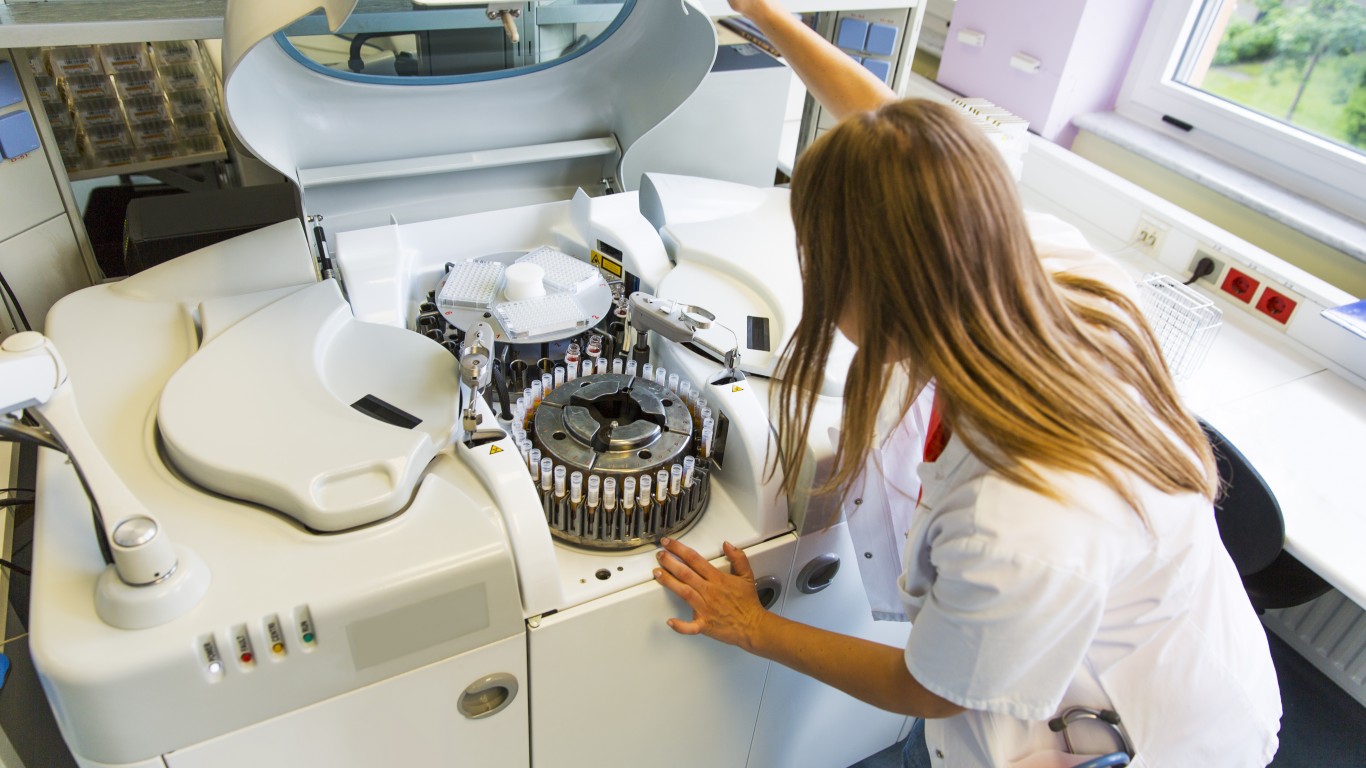
44. Hawaii
> Facilities per million residents: 5.63
> FDA-registered active blood centers: 8
> City with most blood center locations: Honolulu (4)
> Blood center with most locations Clinical Laboratories of Hawaii (3)
> Population: 1,420,491
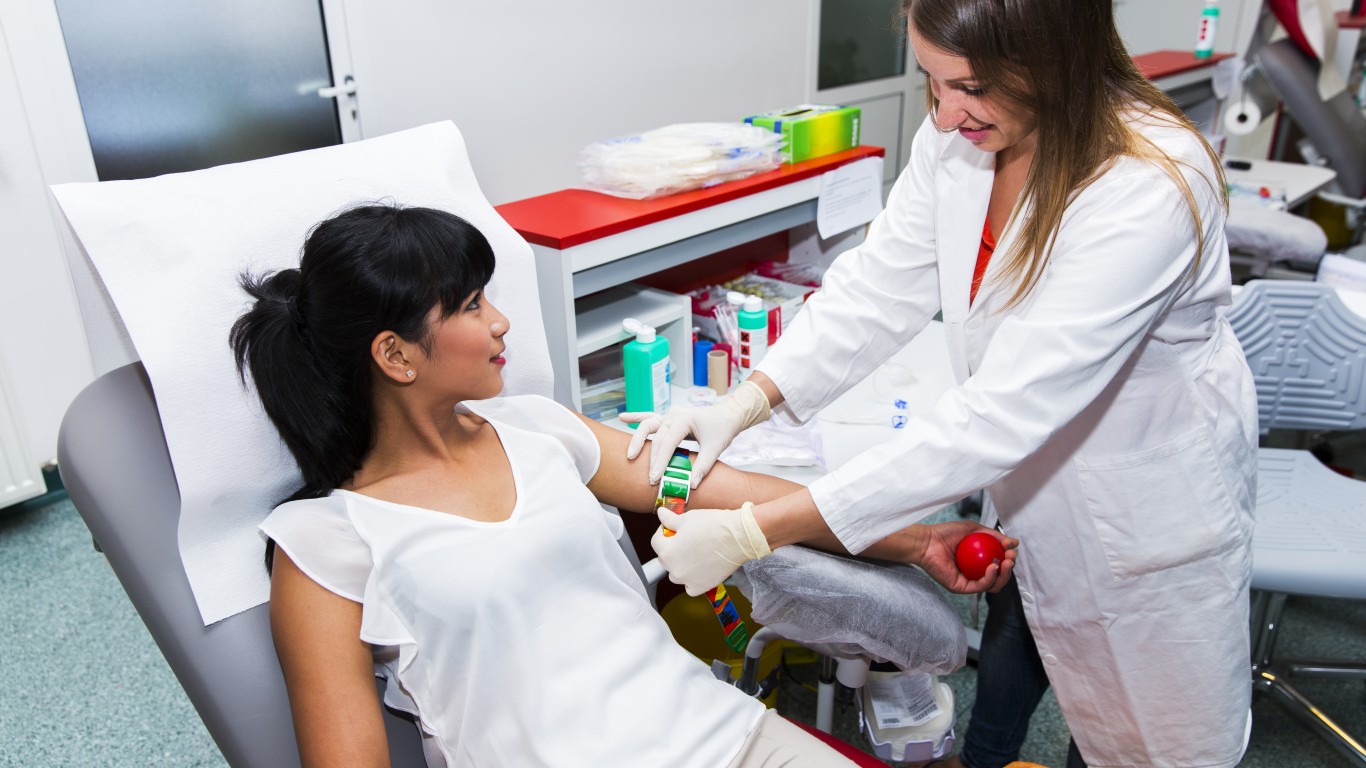
43. Arizona
> Facilities per million residents: 5.86
> FDA-registered active blood centers: 42
> City with most blood center locations: Phoenix (7)
> Blood center with most locations CSL Plasma, Inc. (10)
> Population: 7,171,646
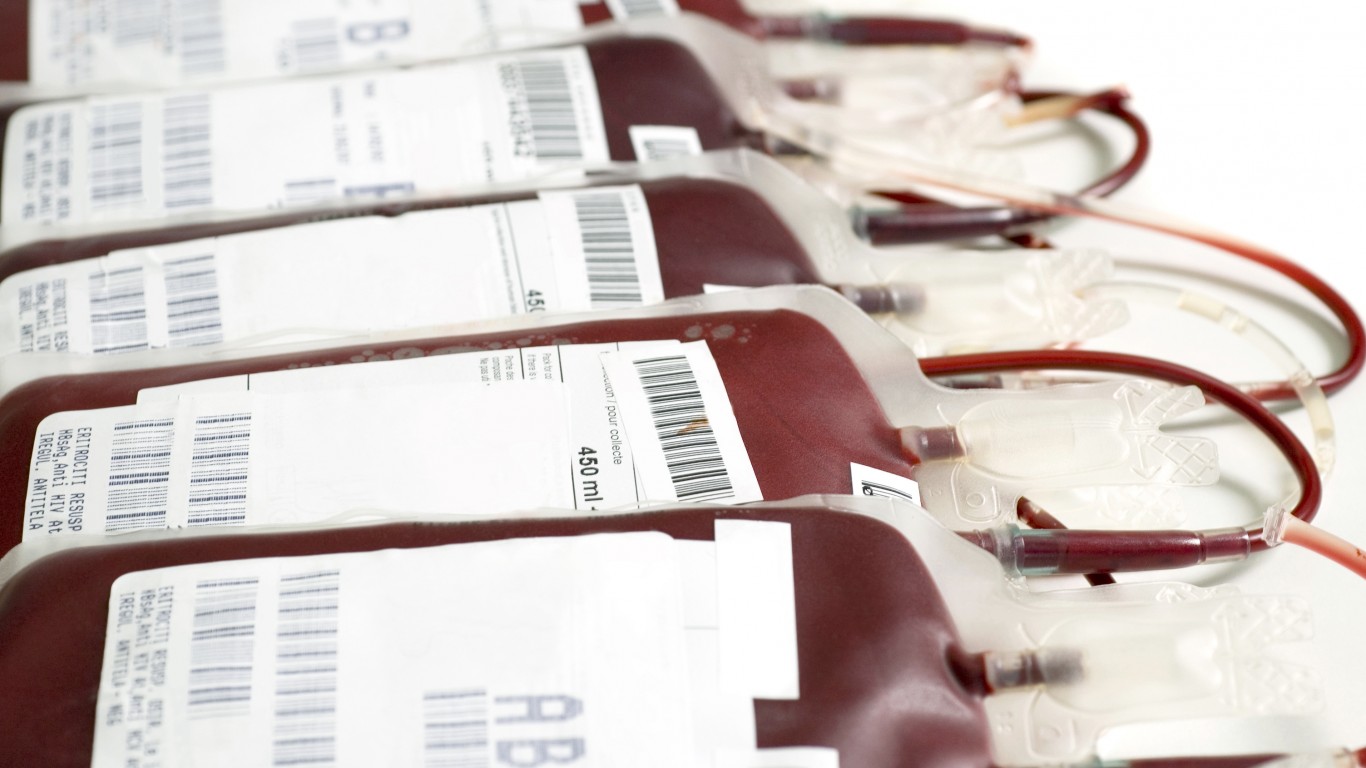
42. Virginia
> Facilities per million residents: 6.10
> FDA-registered active blood centers: 52
> City with most blood center locations: Richmond (6)
> Blood center with most locations American National Red Cross (14)
> Population: 8,517,685
[in-text-ad-2]
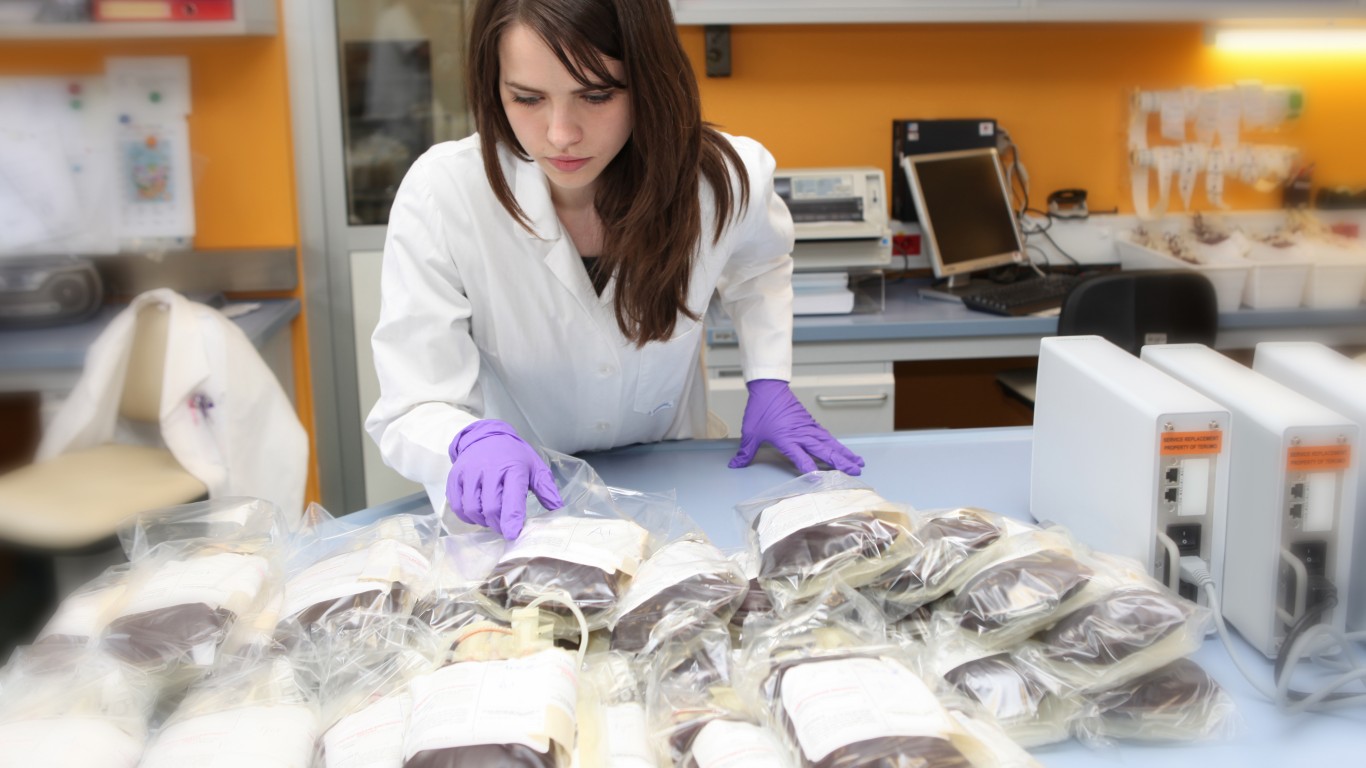
41. Oregon
> Facilities per million residents: 6.44
> FDA-registered active blood centers: 27
> City with most blood center locations: Portland (11)
> Blood center with most locations American National Red Cross (5)
> Population: 4,190,713
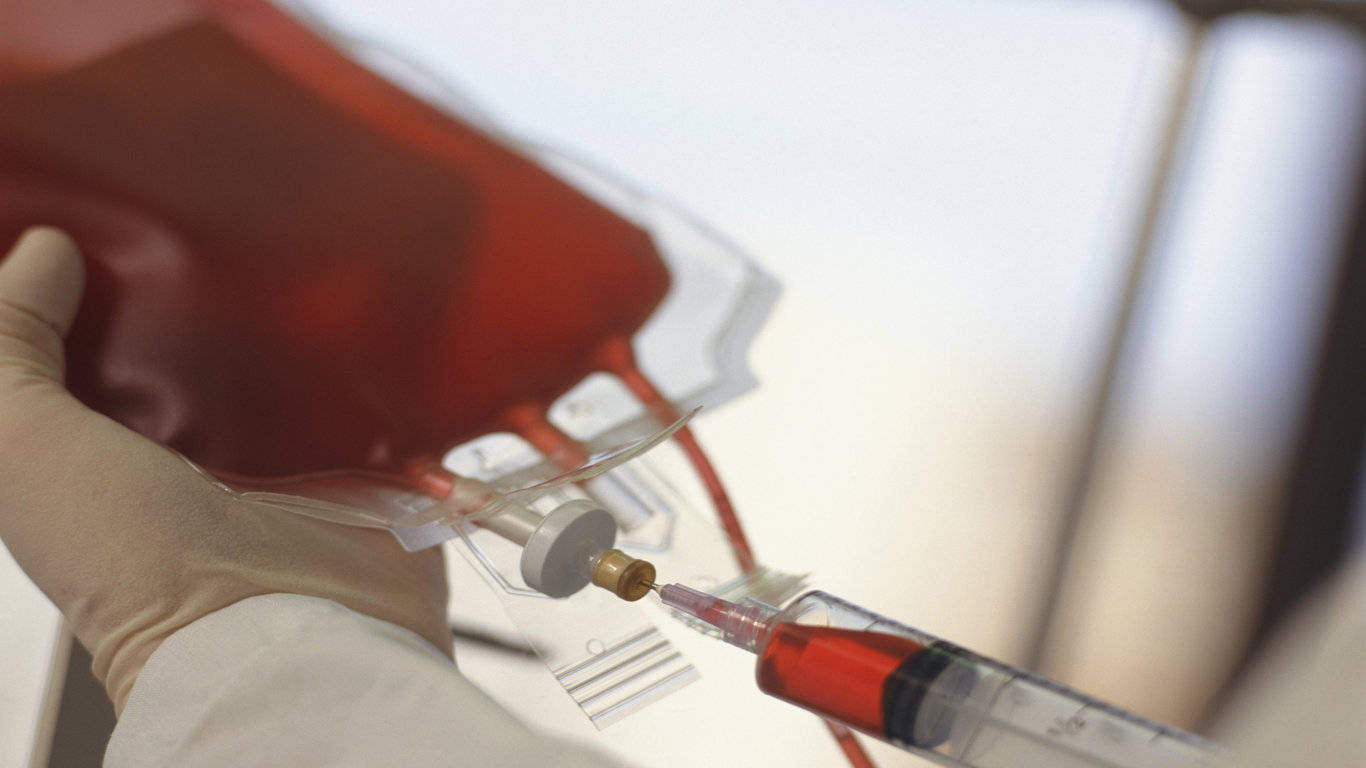
40. New Hampshire
> Facilities per million residents: 6.63
> FDA-registered active blood centers: 9
> City with most blood center locations: Manchester (3)
> Blood center with most locations 8 different facilities, one location each
> Population: 1,356,458
[in-text-ad]
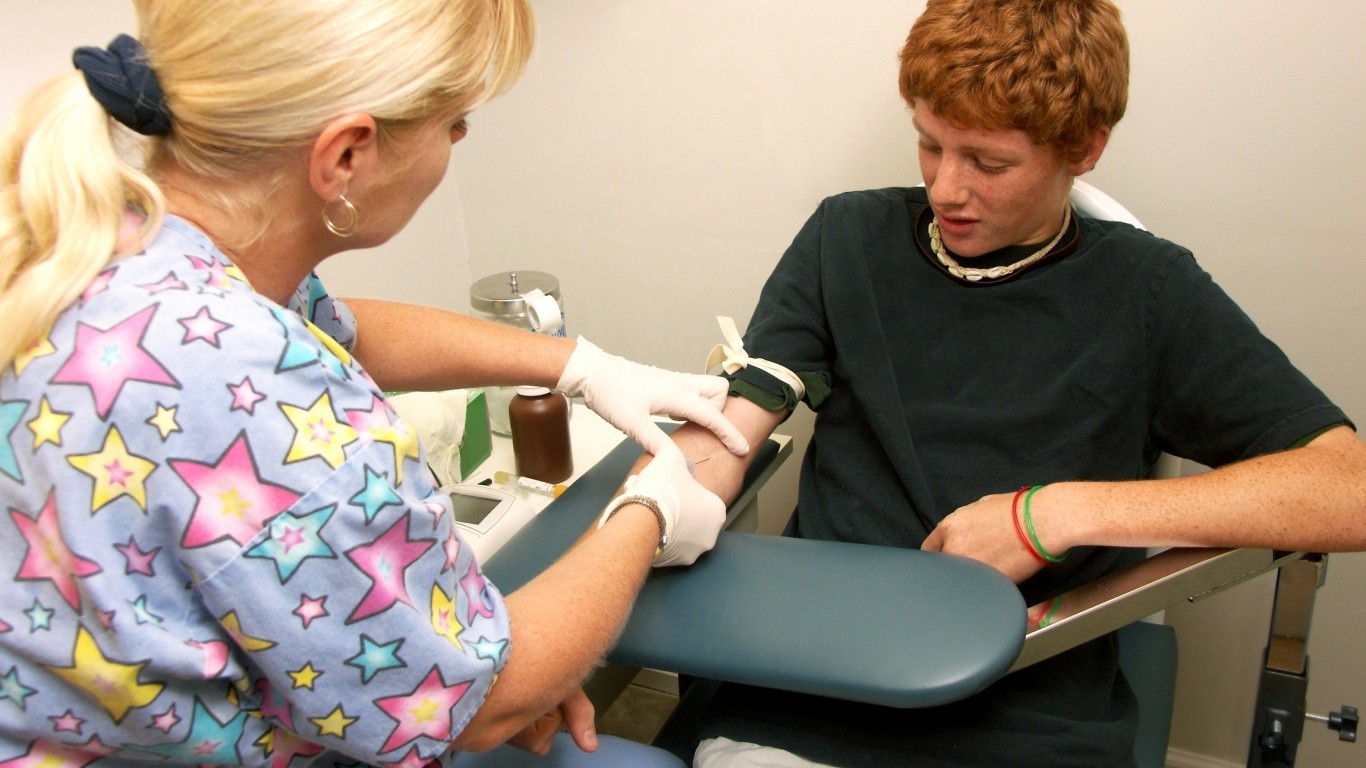
39. Maryland
> Facilities per million residents: 6.95
> FDA-registered active blood centers: 42
> City with most blood center locations: Baltimore (12)
> Blood center with most locations American National Red Cross (7)
> Population: 6,042,718
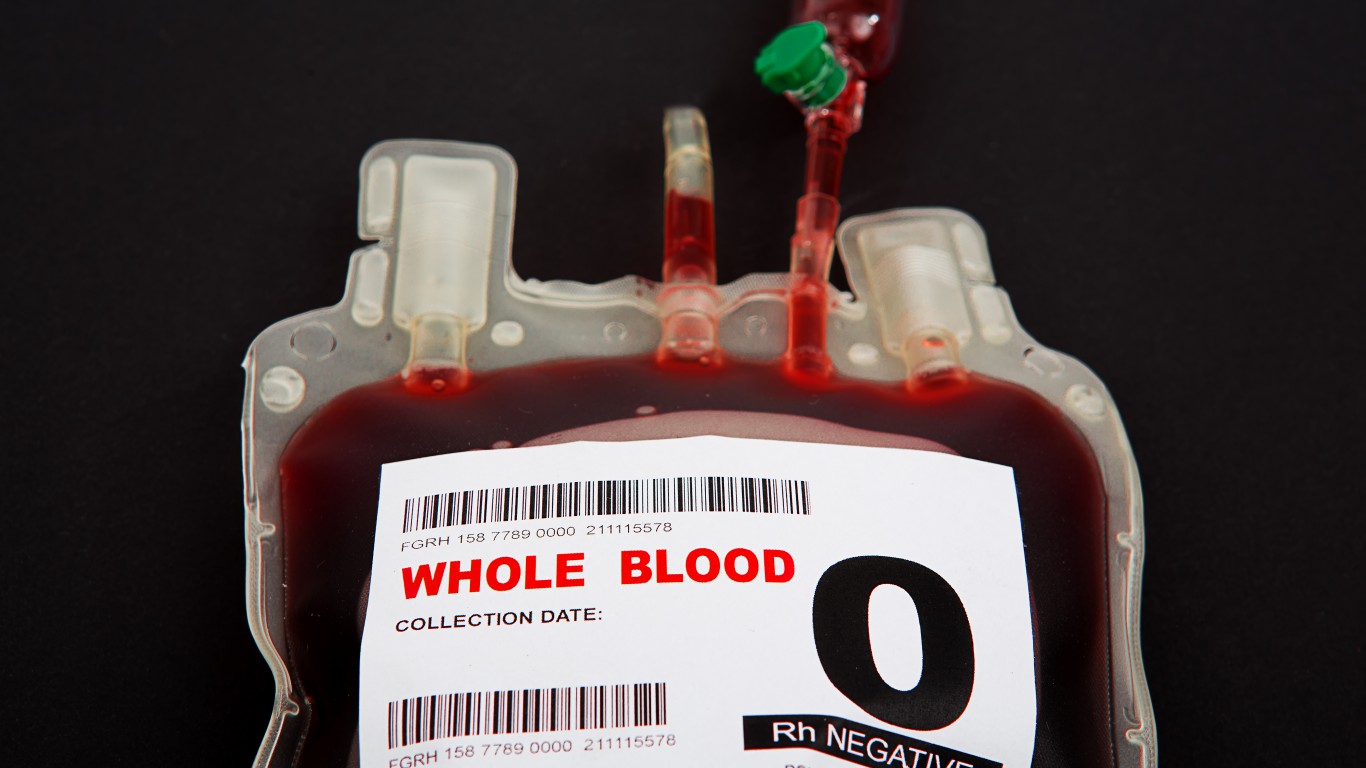
38. Delaware
> Facilities per million residents: 7.24
> FDA-registered active blood centers: 7
> City with most blood center locations: Wilmington (2)
> Blood center with most locations Blood Bank of Delmarva (2) and ChristianaCare (2)
> Population: 967,171
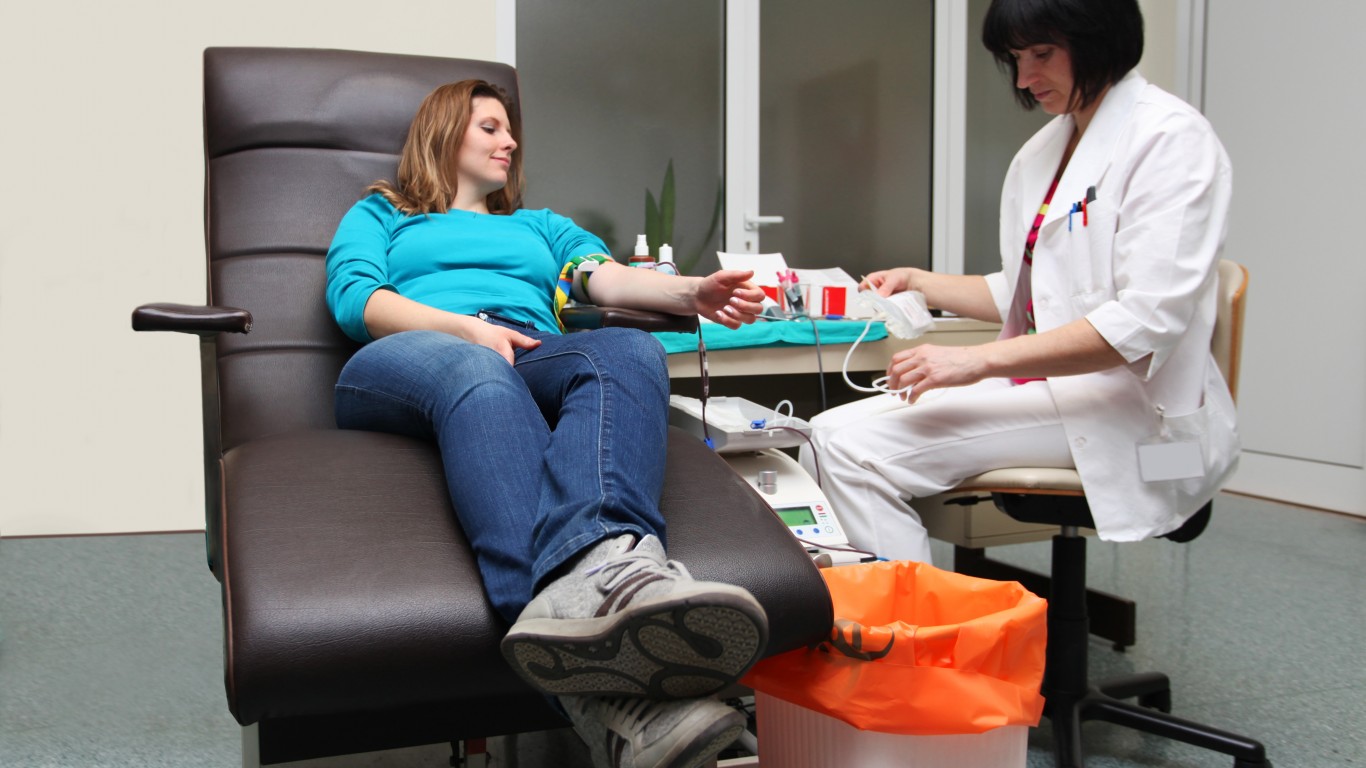
37. Ohio
> Facilities per million residents: 7.61
> FDA-registered active blood centers: 89
> City with most blood center locations: Columbus (13)
> Blood center with most locations CSL Plasma, Inc. (16)
> Population: 11,689,442
[in-text-ad-2]
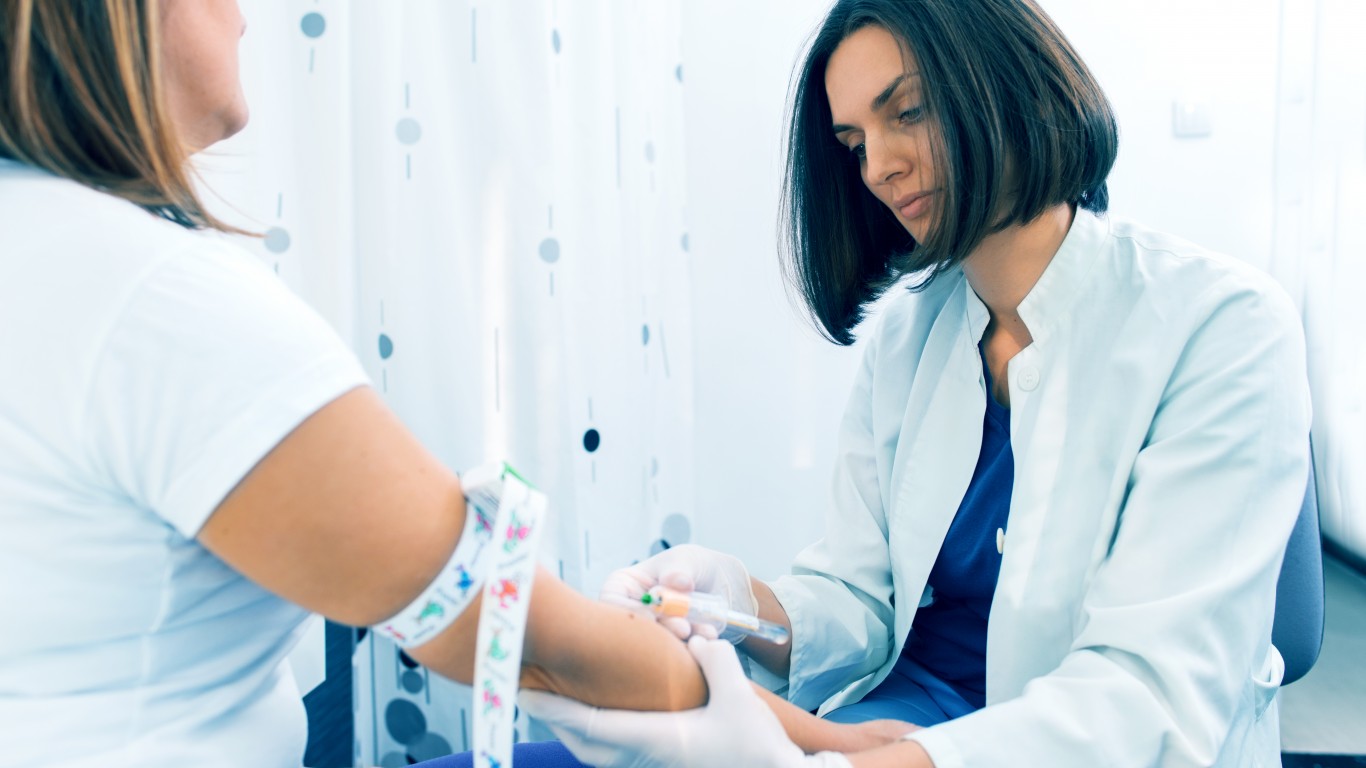
36. West Virginia
> Facilities per million residents: 7.75
> FDA-registered active blood centers: 14
> City with most blood center locations: Huntington (3)
> Blood center with most locations American National Red Cross (3)
> Population: 1,805,832
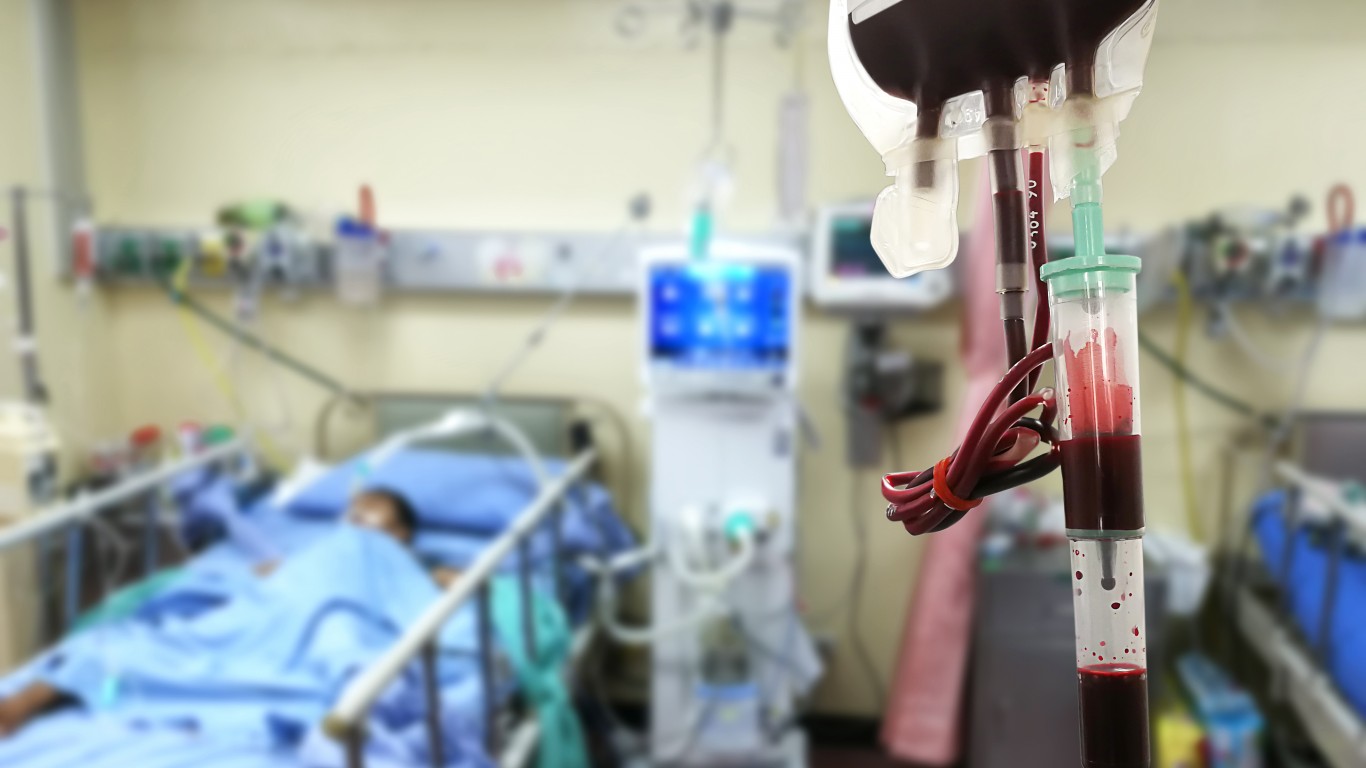
35. Washington
> Facilities per million residents: 7.96
> FDA-registered active blood centers: 60
> City with most blood center locations: Seattle (8)
> Blood center with most locations Bloodworks (15)
> Population: 7,535,591
[in-text-ad]
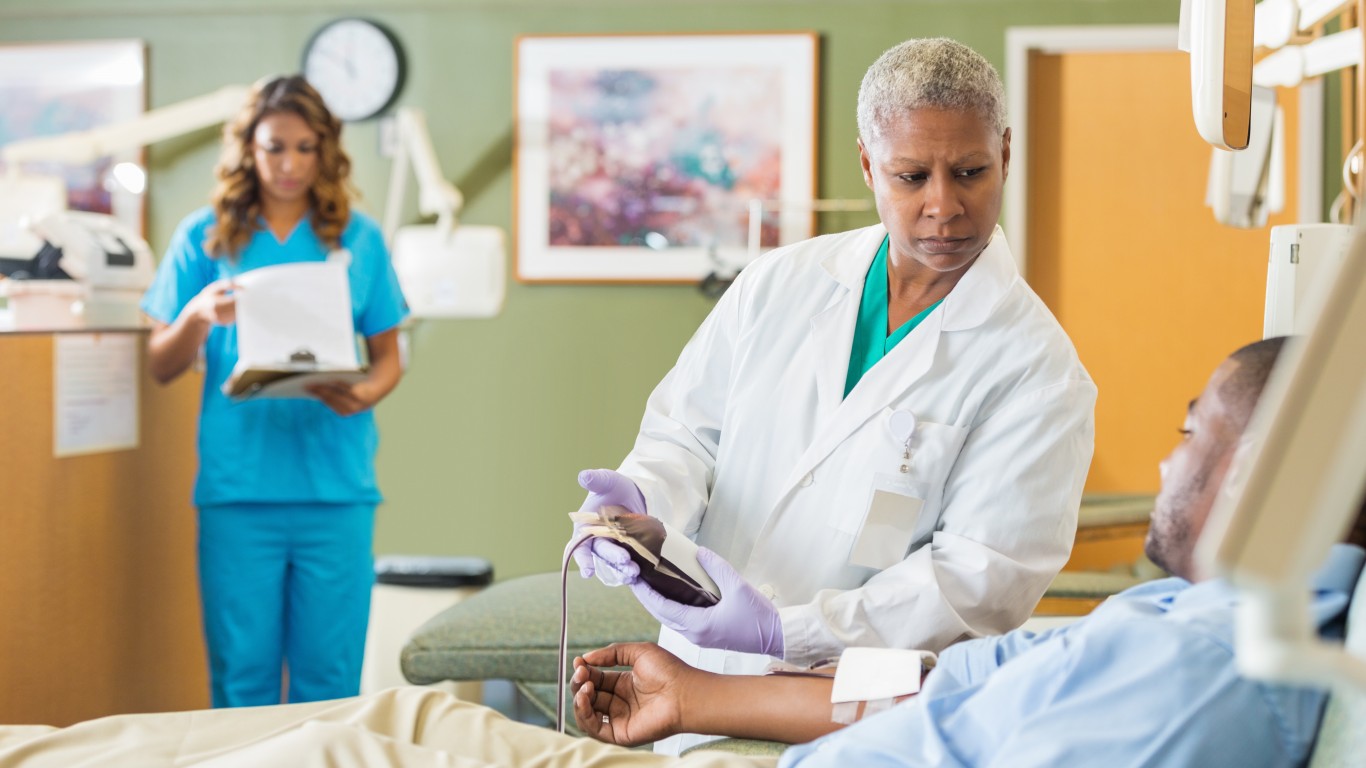
34. New Mexico
> Facilities per million residents: 8.11
> FDA-registered active blood centers: 17
> City with most blood center locations: Albuquerque (8)
> Blood center with most locations BPL Plasma, Inc. (5) and Vitalant (5)
> Population: 2,095,428
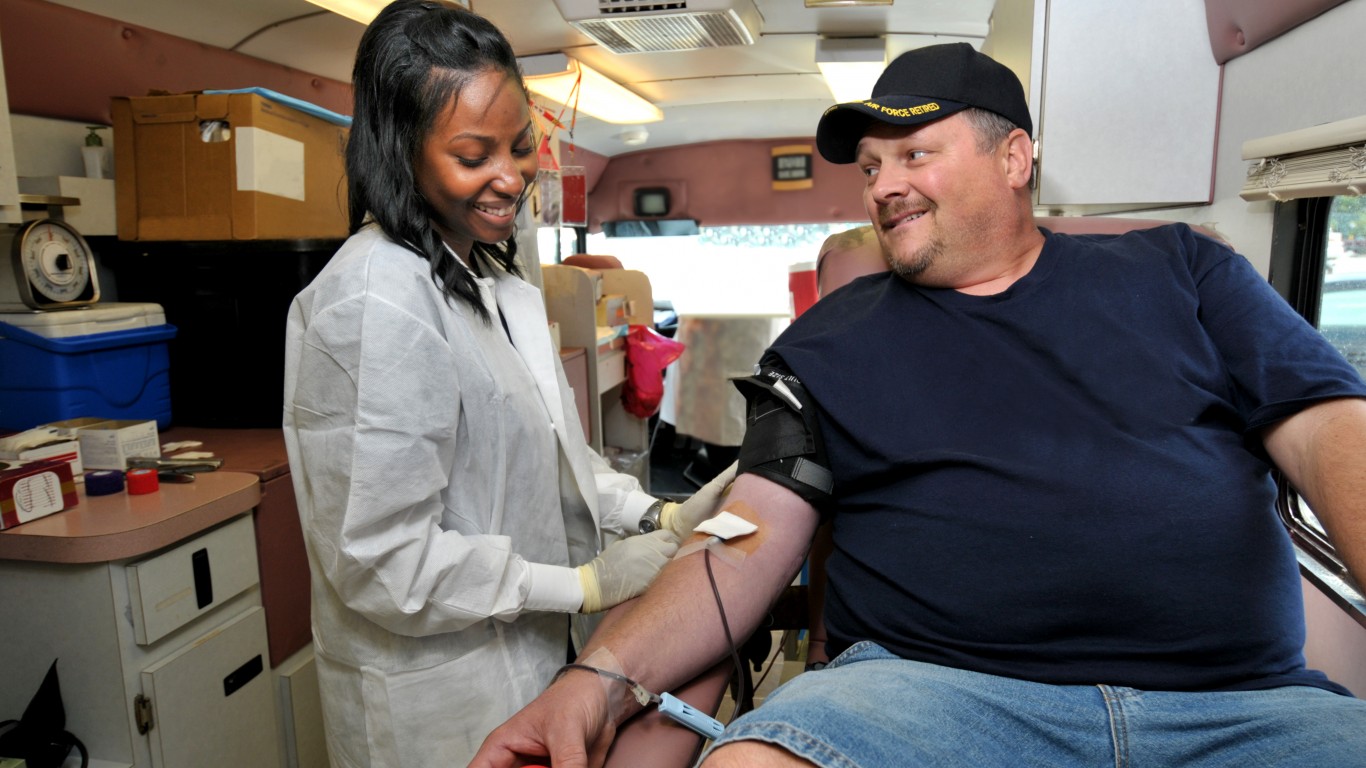
33. Oklahoma
> Facilities per million residents: 8.12
> FDA-registered active blood centers: 32
> City with most blood center locations: Oklahoma City (9) and Tulsa (9)
> Blood center with most locations Oklahoma Blood Institute (9)
> Population: 3,943,079
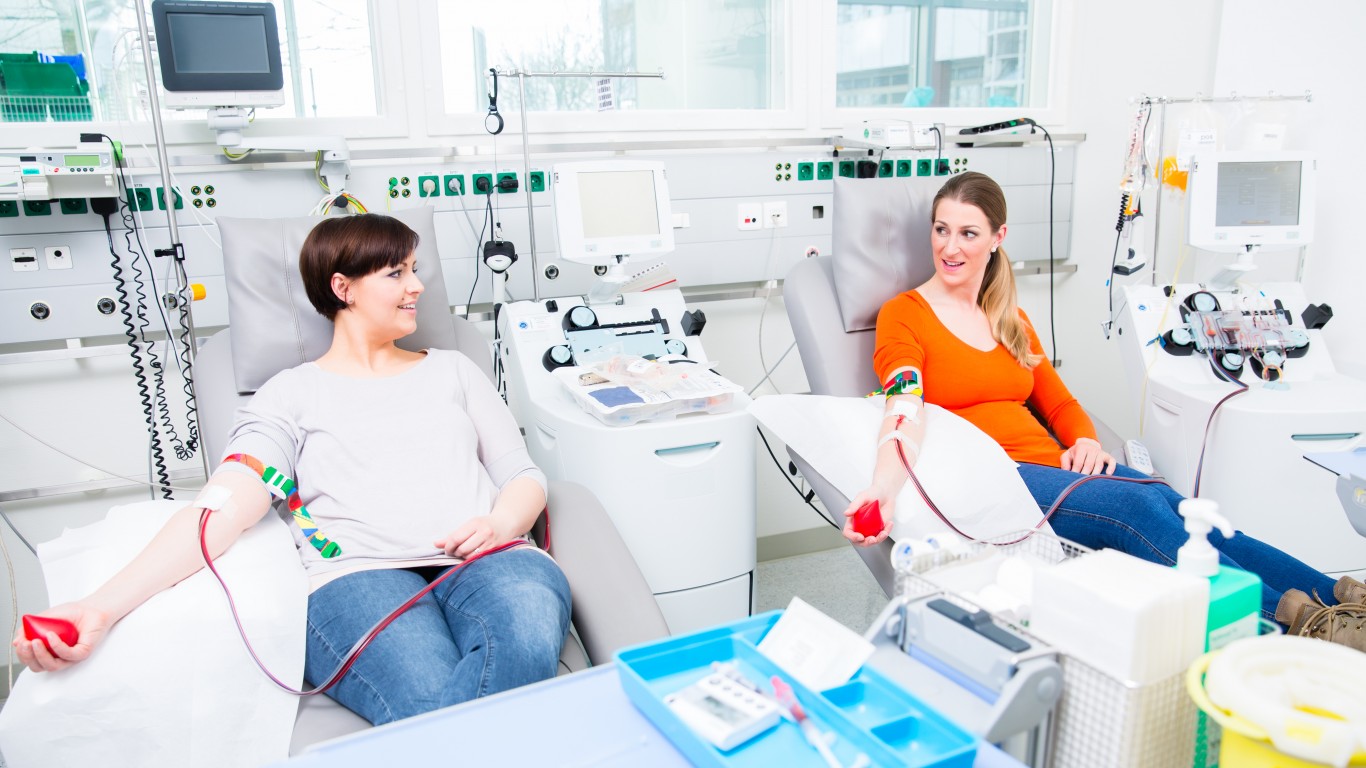
32. Kansas
> Facilities per million residents: 8.24
> FDA-registered active blood centers: 24
> City with most blood center locations: Wichita (8)
> Blood center with most locations American National Red Cross (5)
> Population: 2,911,510
[in-text-ad-2]
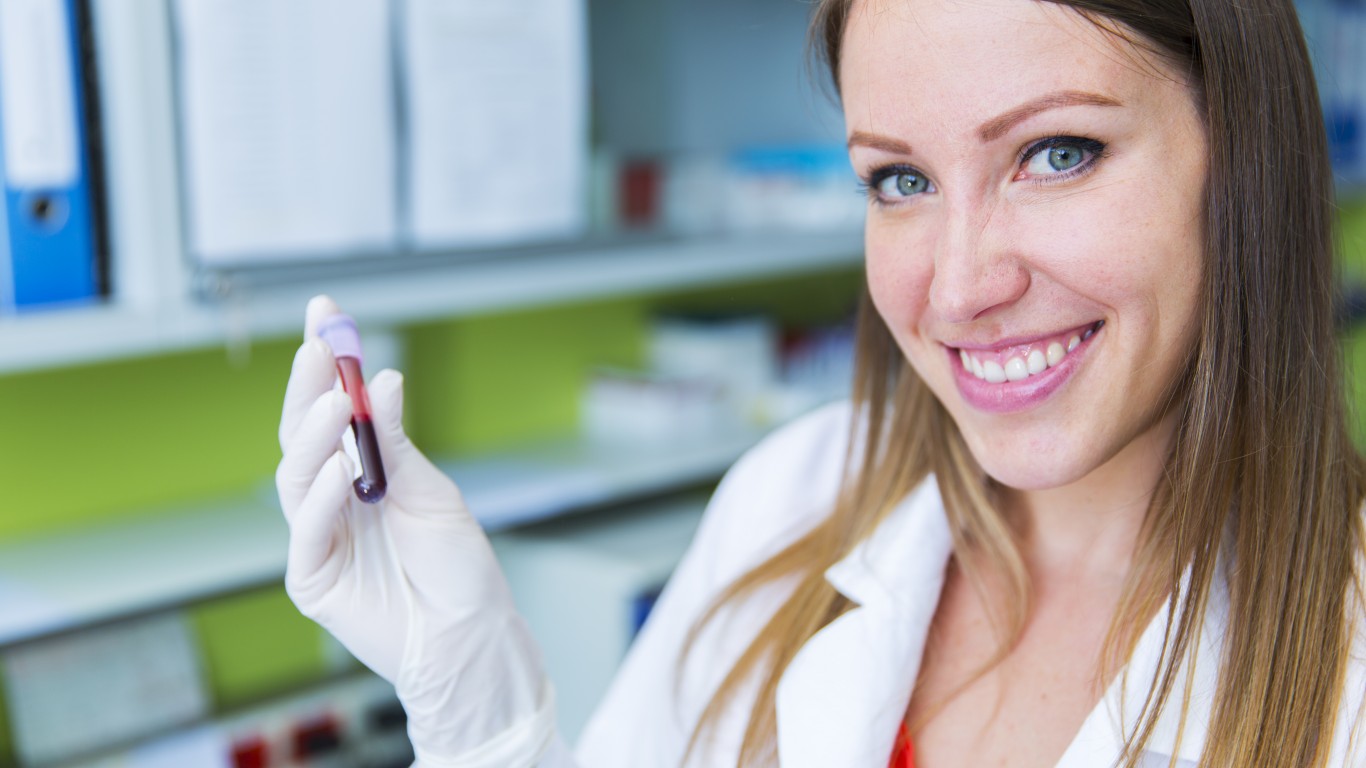
31. Minnesota
> Facilities per million residents: 8.38
> FDA-registered active blood centers: 47
> City with most blood center locations: Minneapolis (7)
> Blood center with most locations Innovate Blood Resources (9)
> Population: 5,611,179
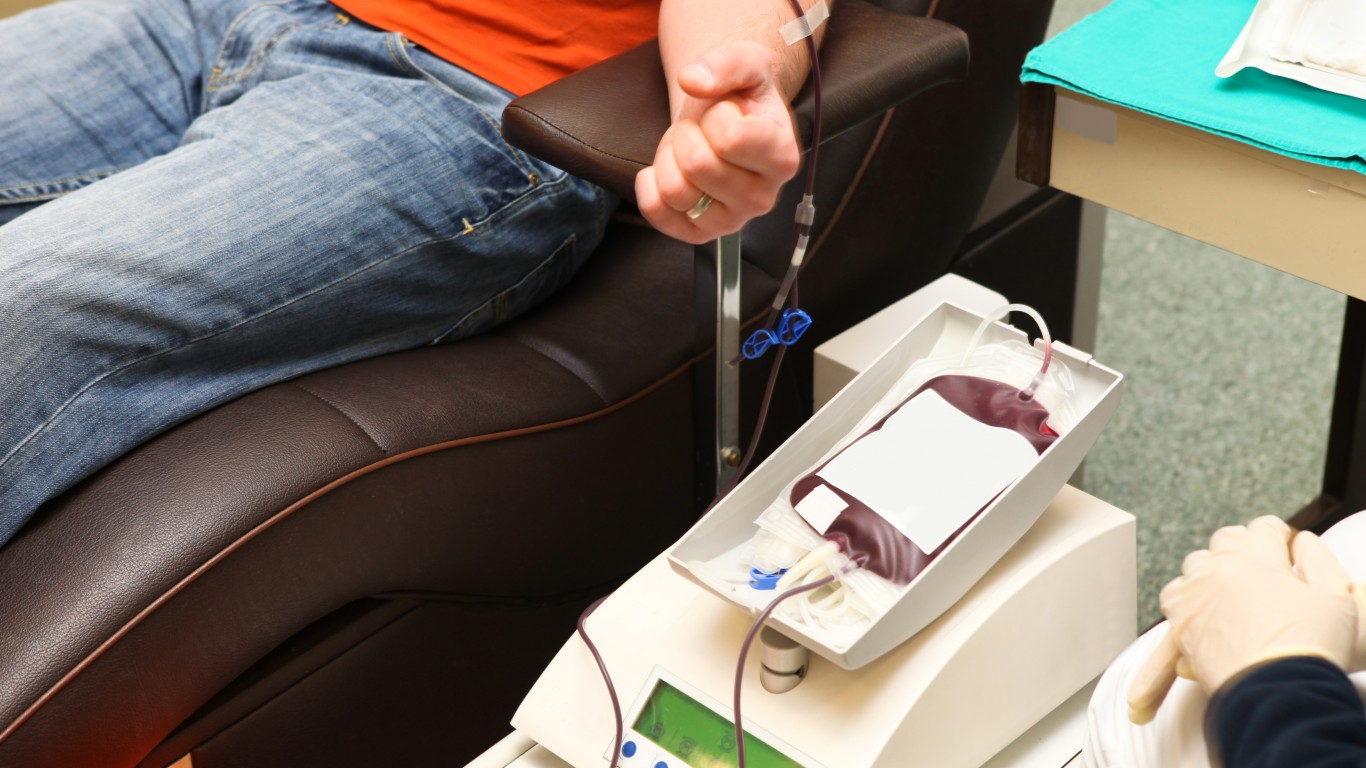
30. Colorado
> Facilities per million residents: 8.60
> FDA-registered active blood centers: 49
> City with most blood center locations: Colorado Springs (6)
> Blood center with most locations Vitalant (8)
> Population: 5,695,564
[in-text-ad]
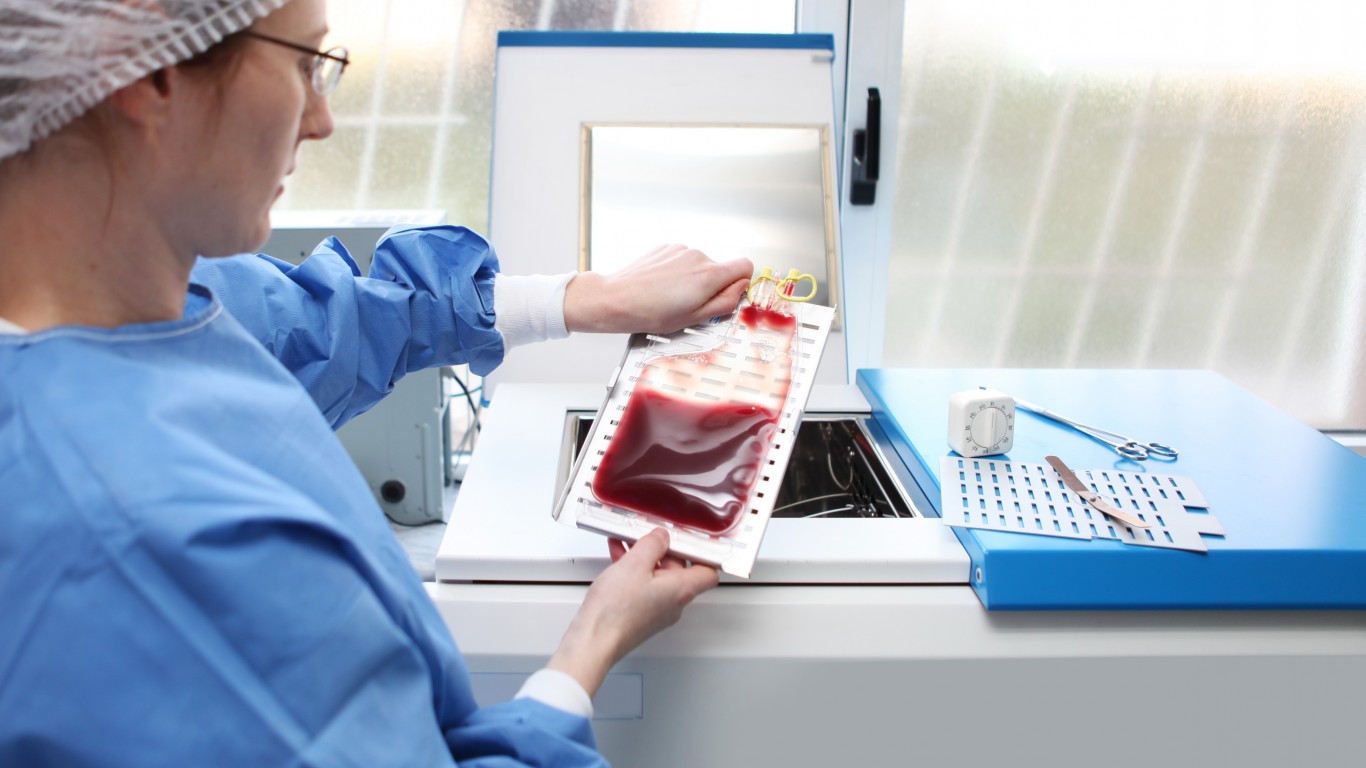
29. South Carolina
> Facilities per million residents: 8.65
> FDA-registered active blood centers: 44
> City with most blood center locations: Charleston (9)
> Blood center with most locations Blood Connection, Inc. (7)
> Population: 5,084,127

28. Michigan
> Facilities per million residents: 8.70
> FDA-registered active blood centers: 87
> City with most blood center locations: Lansing (6) and Detroit (6)
> Blood center with most locations CSL Plasma, Inc. (18)
> Population: 9,995,915
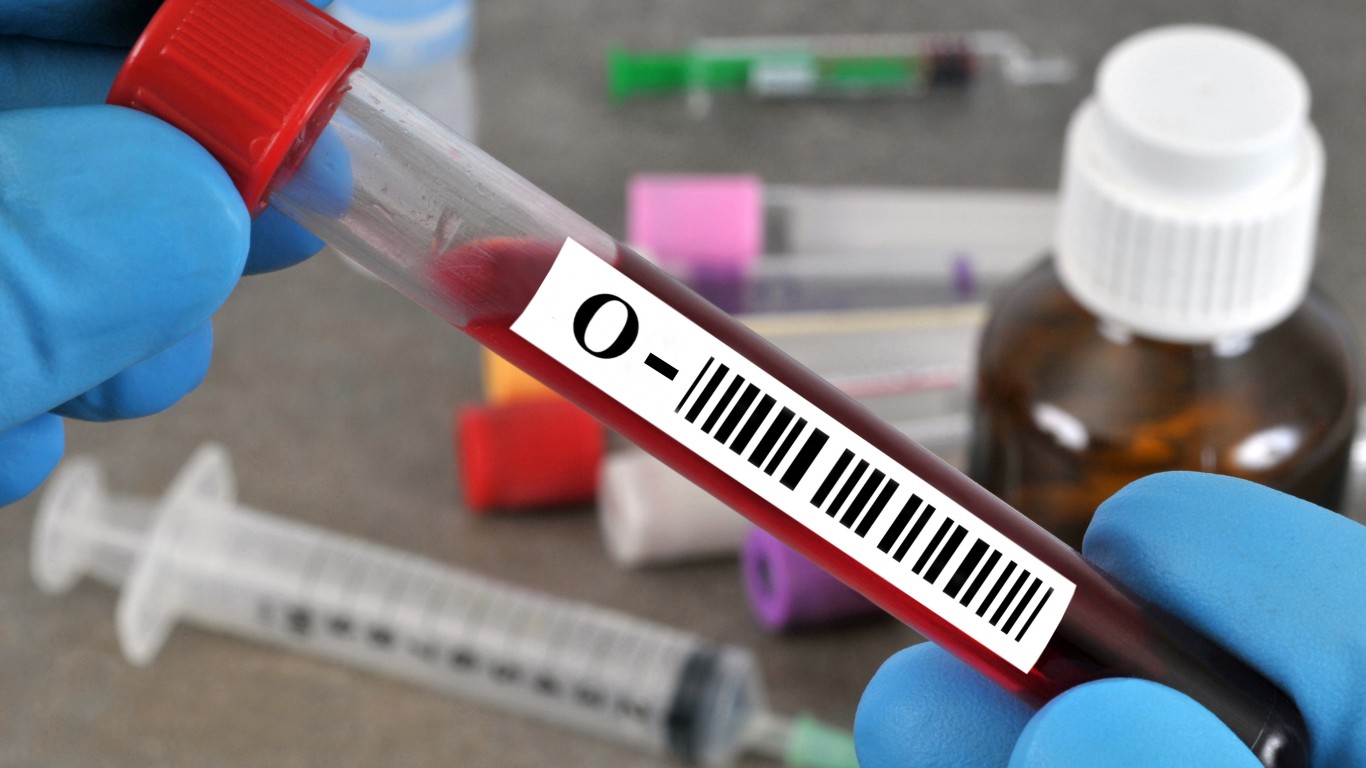
27. Mississippi
> Facilities per million residents: 8.71
> FDA-registered active blood centers: 26
> City with most blood center locations: Jackson (7)
> Blood center with most locations CSL Plasma, Inc. (3), Mississippi Blood Services, Inc. (3) and Vitalant (3)
> Population: 2,986,530
[in-text-ad-2]
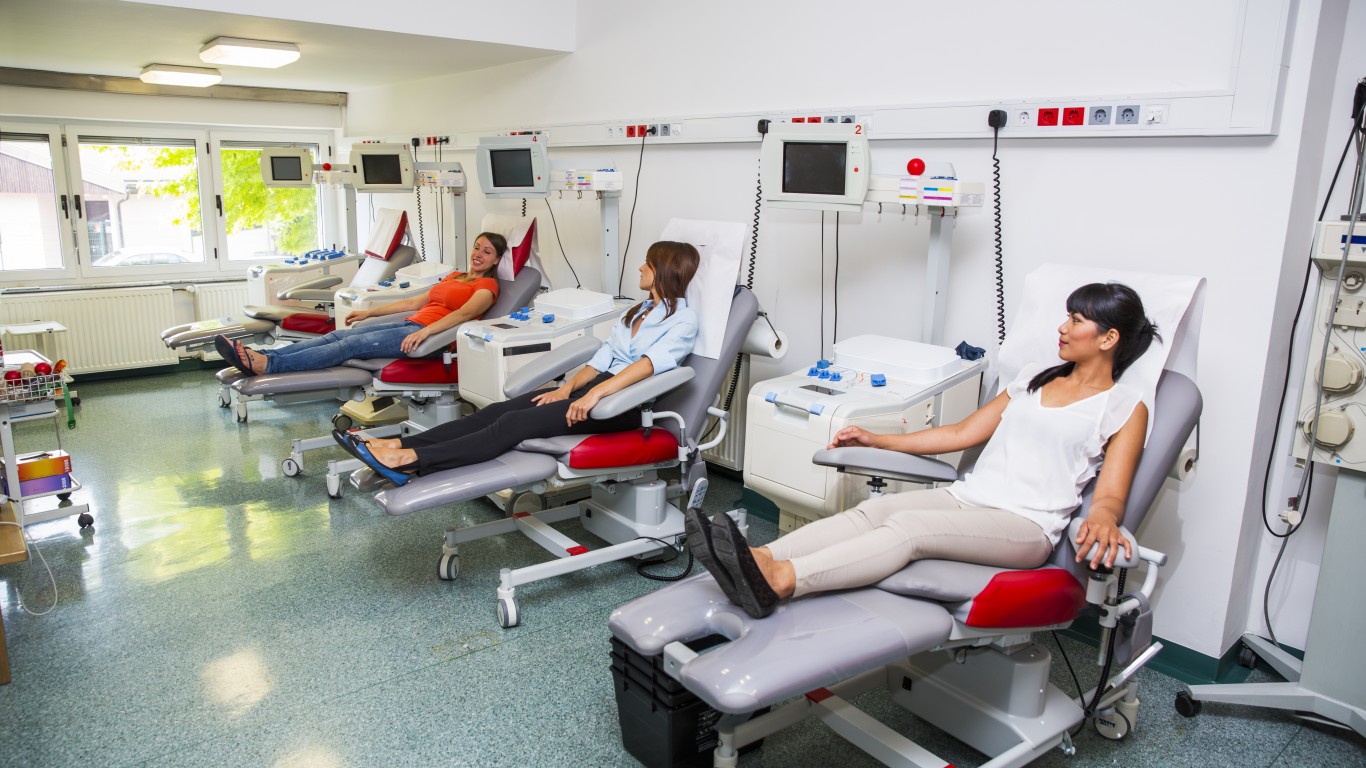
26. Georgia
> Facilities per million residents: 9.22
> FDA-registered active blood centers: 97
> City with most blood center locations: Atlanta (12)
> Blood center with most locations American National Red Cross (10)
> Population: 10,519,475
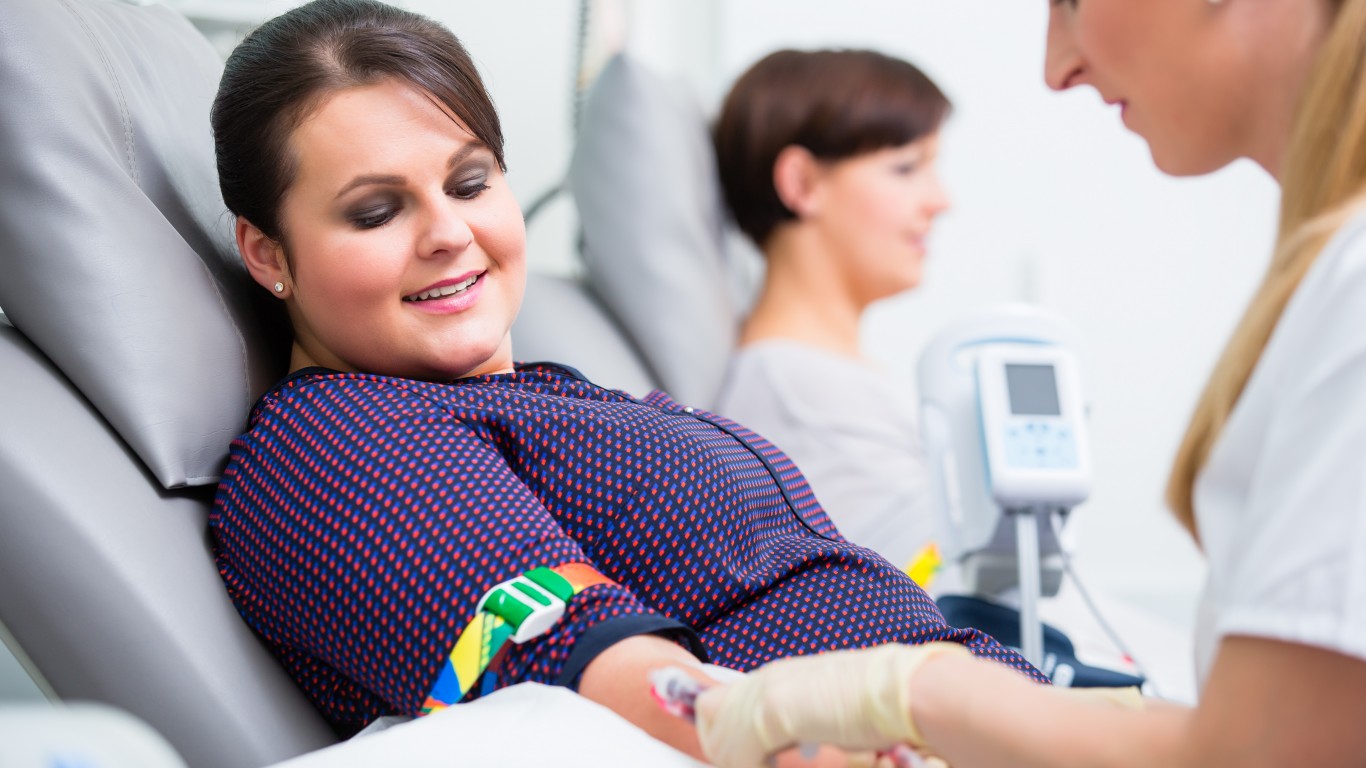
25. Nevada
> Facilities per million residents: 9.23
> FDA-registered active blood centers: 28
> City with most blood center locations: Las Vegas (10)
> Blood center with most locations Vitalant (6)
> Population: 3,034,392
[in-text-ad]
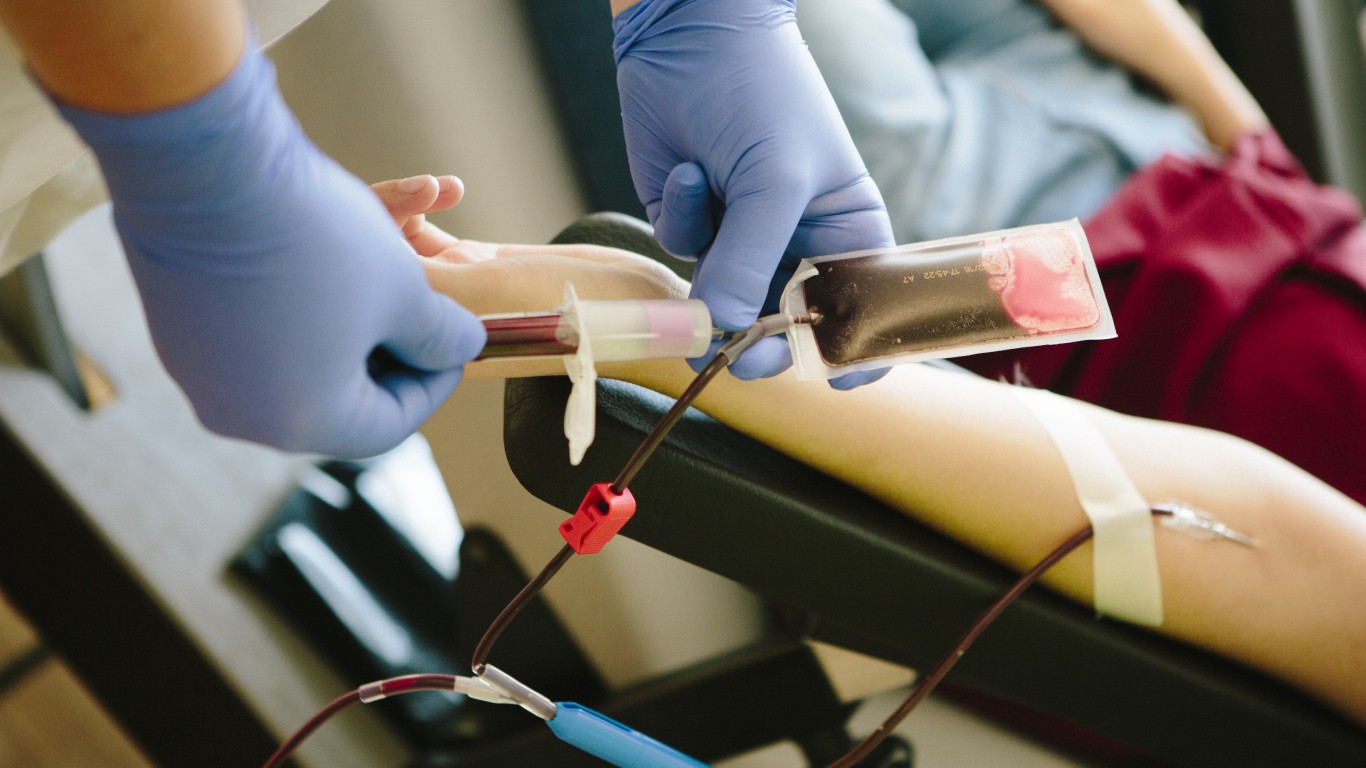
24. North Carolina
> Facilities per million residents: 9.25
> FDA-registered active blood centers: 96
> City with most blood center locations: Charlotte (16)
> Blood center with most locations Biomat USA, Inc. (14)
> Population: 10,383,620
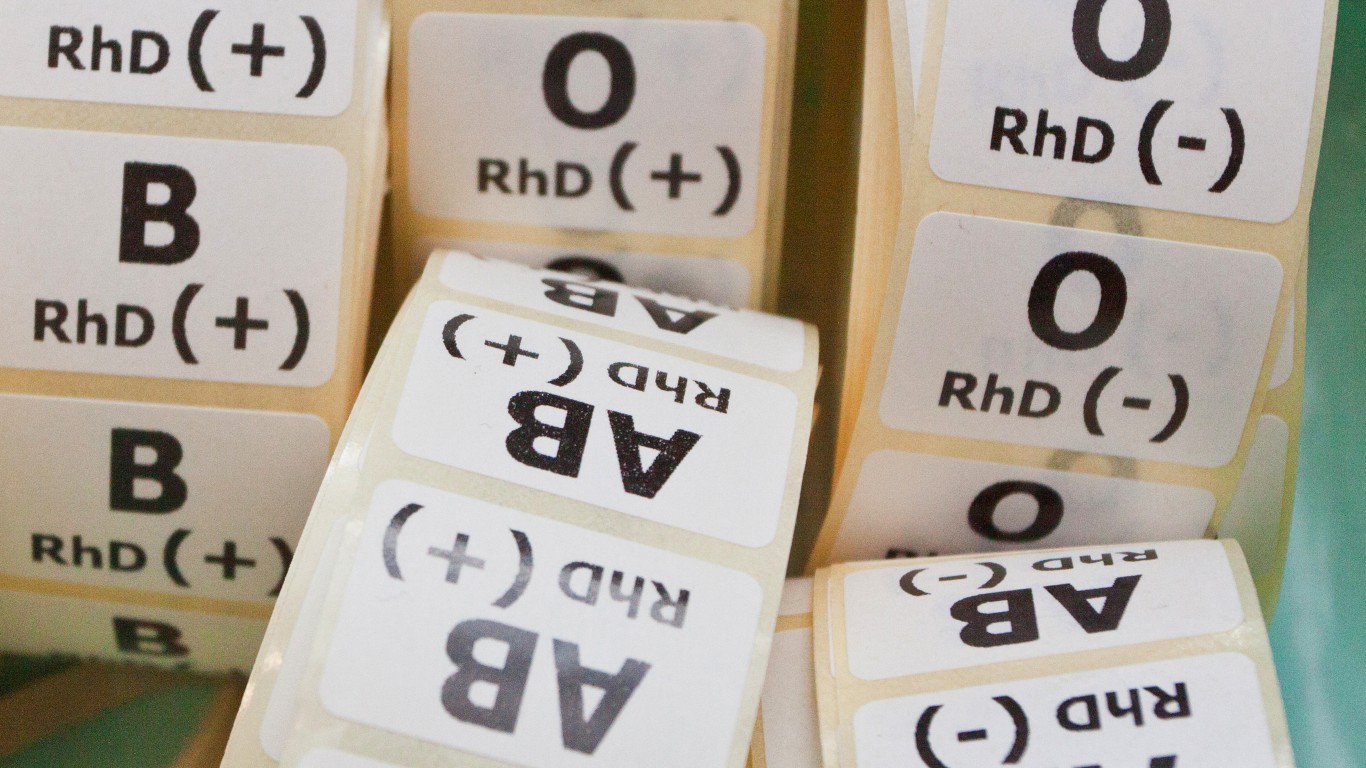
23. Arkansas
> Facilities per million residents: 9.29
> FDA-registered active blood centers: 28
> City with most blood center locations: Little Rock (8)
> Blood center with most locations Arkansas Blood Institute (5)
> Population: 3,013,825
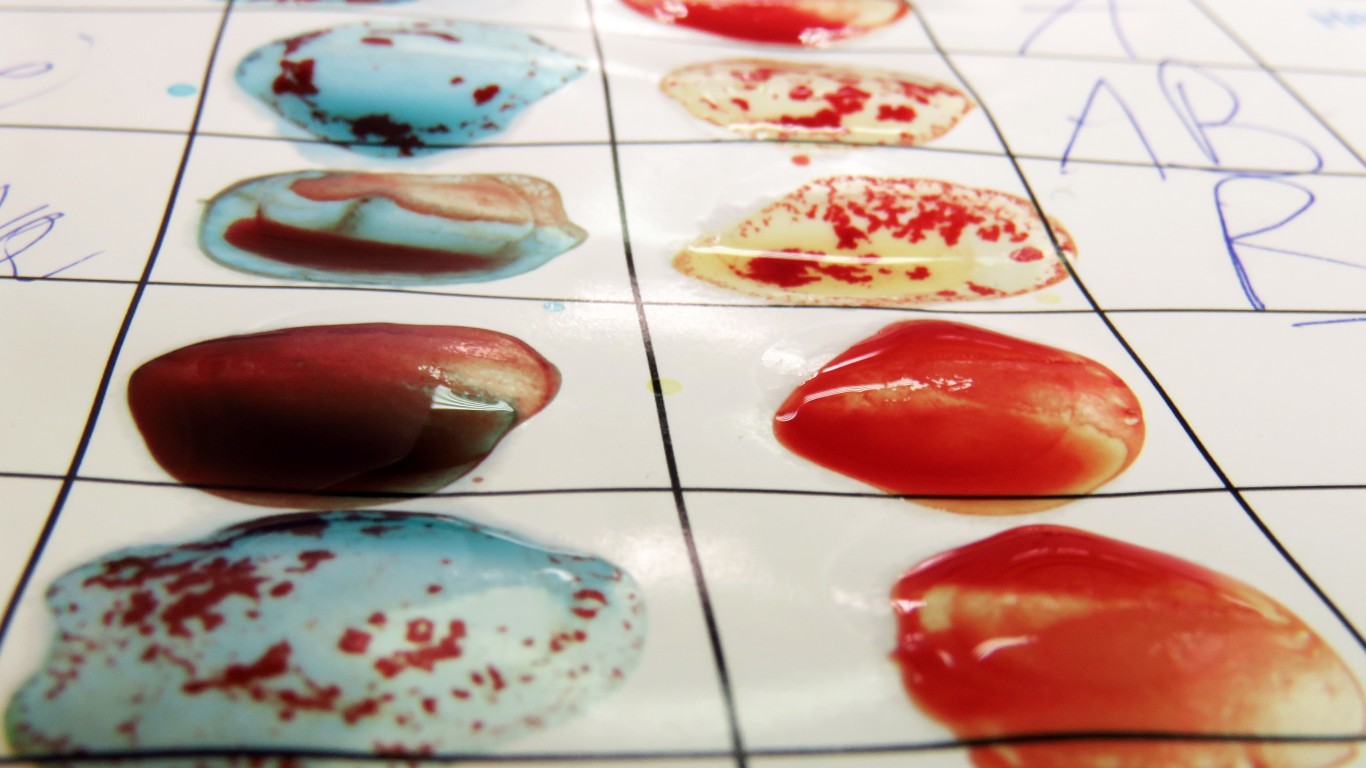
22. Texas
> Facilities per million residents: 9.34
> FDA-registered active blood centers: 268
> City with most blood center locations: Houston (31)
> Blood center with most locations Biomat USA, Inc. (34)
> Population: 28,701,845
[in-text-ad-2]
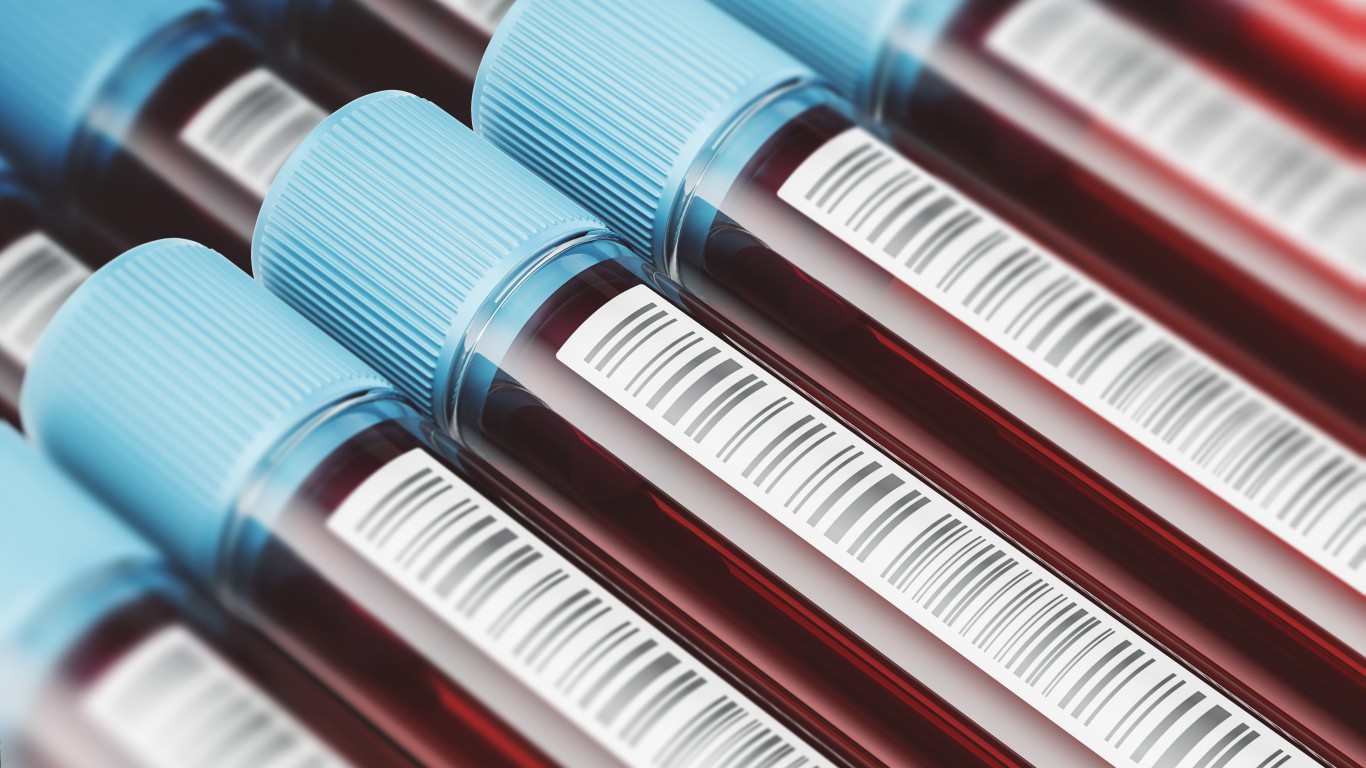
21. Kentucky
> Facilities per million residents: 9.40
> FDA-registered active blood centers: 42
> City with most blood center locations: Louisville (16)
> Blood center with most locations Kentucky Blood Center, Inc. (7)
> Population: 4,468,402
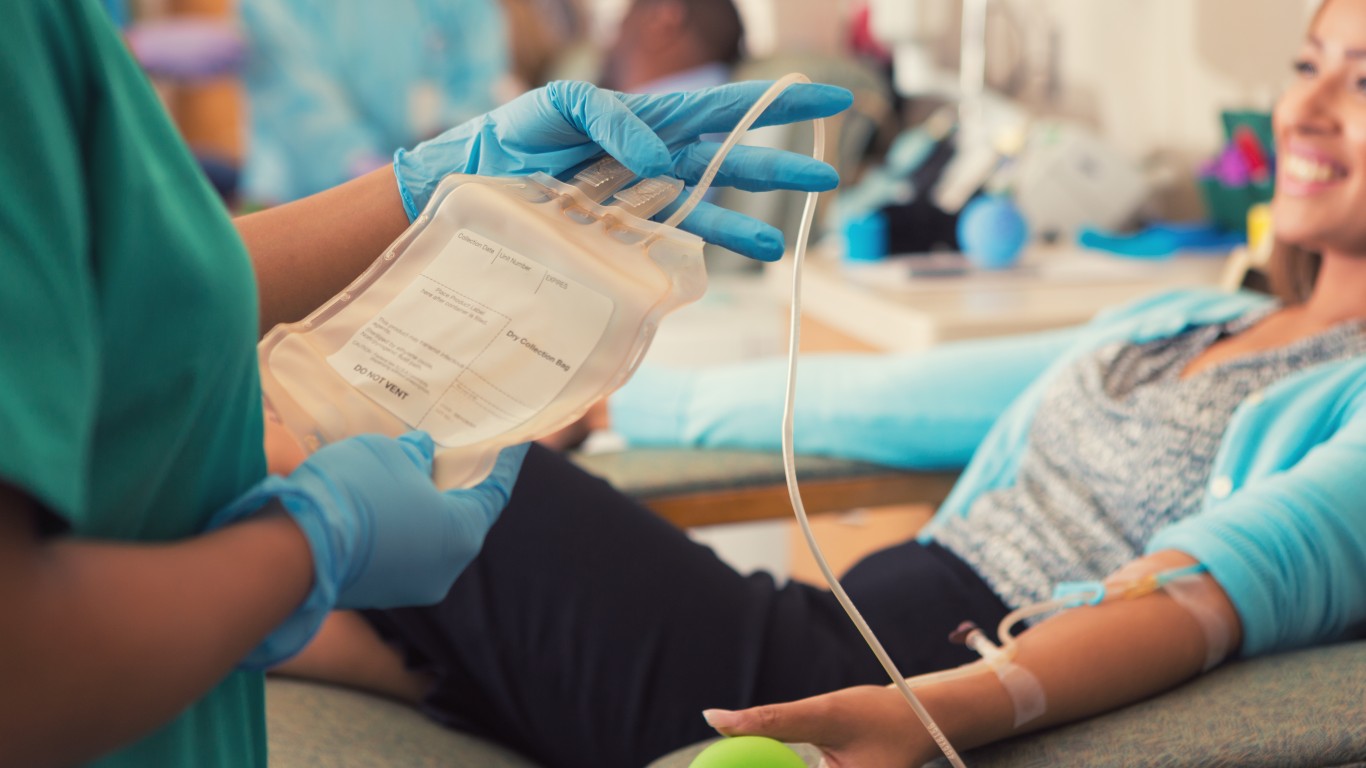
20. Pennsylvania
> Facilities per million residents: 9.45
> FDA-registered active blood centers: 121
> City with most blood center locations: Pittsburgh (19)
> Blood center with most locations American National Red Cross (11)
> Population: 12,807,060
[in-text-ad]

19. Rhode Island
> Facilities per million residents: 9.46
> FDA-registered active blood centers: 10
> City with most blood center locations: Providence (2) and Warwick (2)
> Blood center with most locations Rhode Island Blood Center (6)
> Population: 1,057,315

18. Illinois
> Facilities per million residents: 9.65
> FDA-registered active blood centers: 123
> City with most blood center locations: Chicago (17)
> Blood center with most locations LifeSource (18)
> Population: 12,741,080
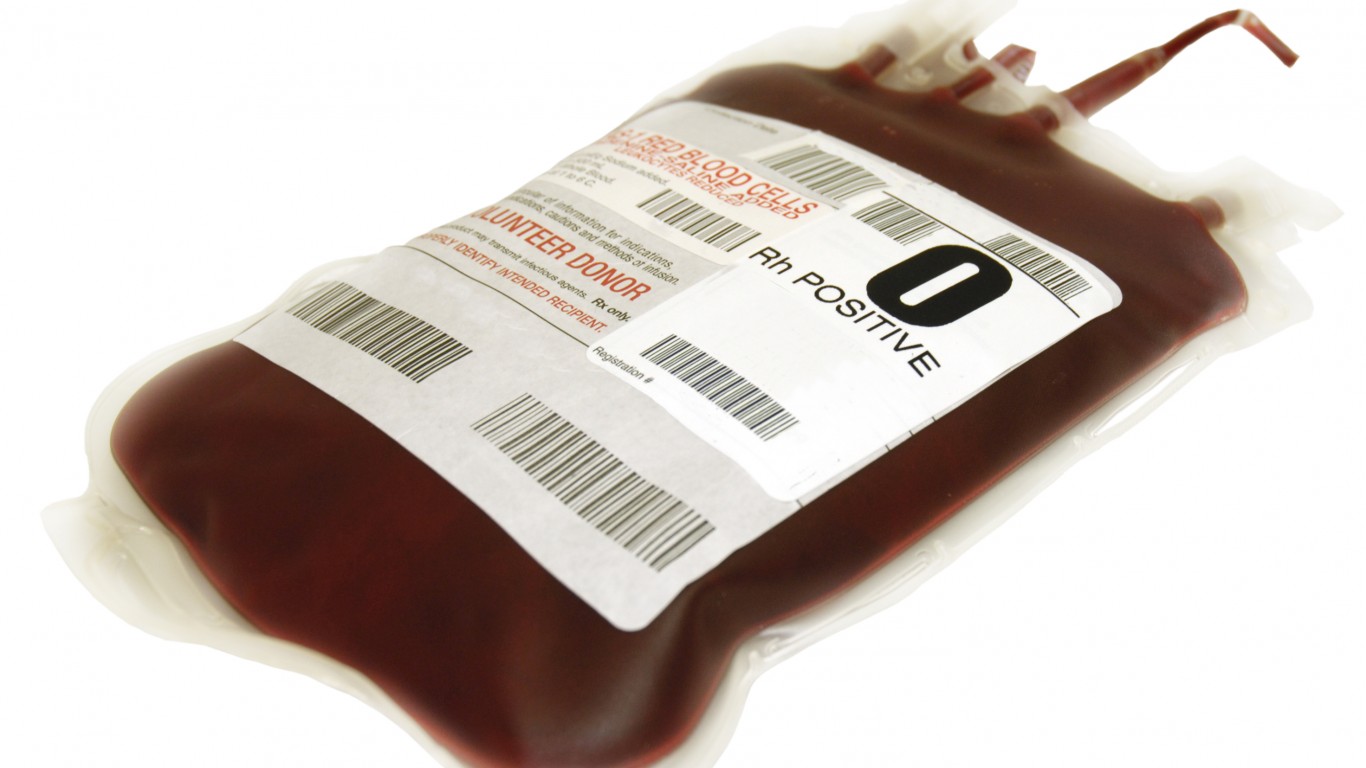
17. Alabama
> Facilities per million residents: 9.82
> FDA-registered active blood centers: 48
> City with most blood center locations: Birmingham (12)
> Blood center with most locations LifeSouth Community Blood Centers, Inc. (13)
> Population: 4,887,871
[in-text-ad-2]
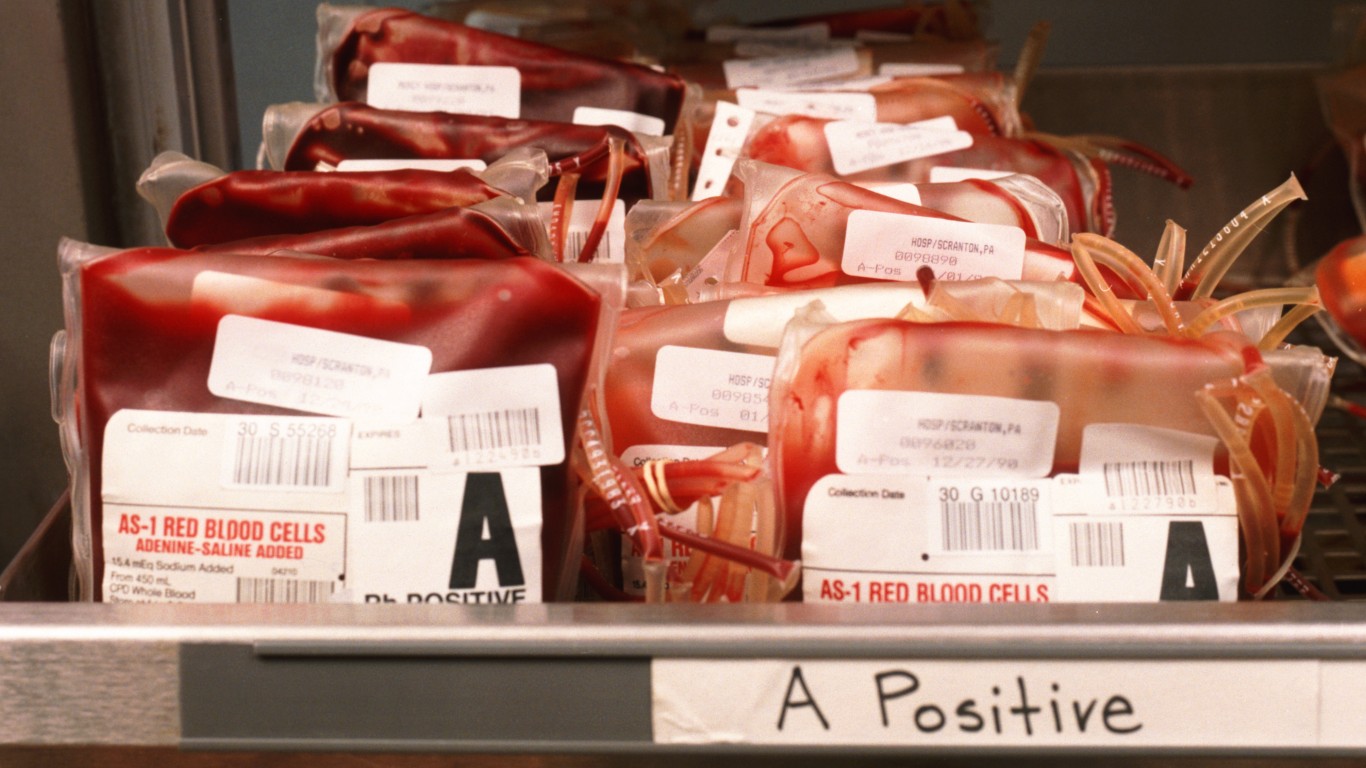
16. Missouri
> Facilities per million residents: 9.96
> FDA-registered active blood centers: 61
> City with most blood center locations: St. Louis (12)
> Blood center with most locations American National Red Cross (9)
> Population: 6,126,452
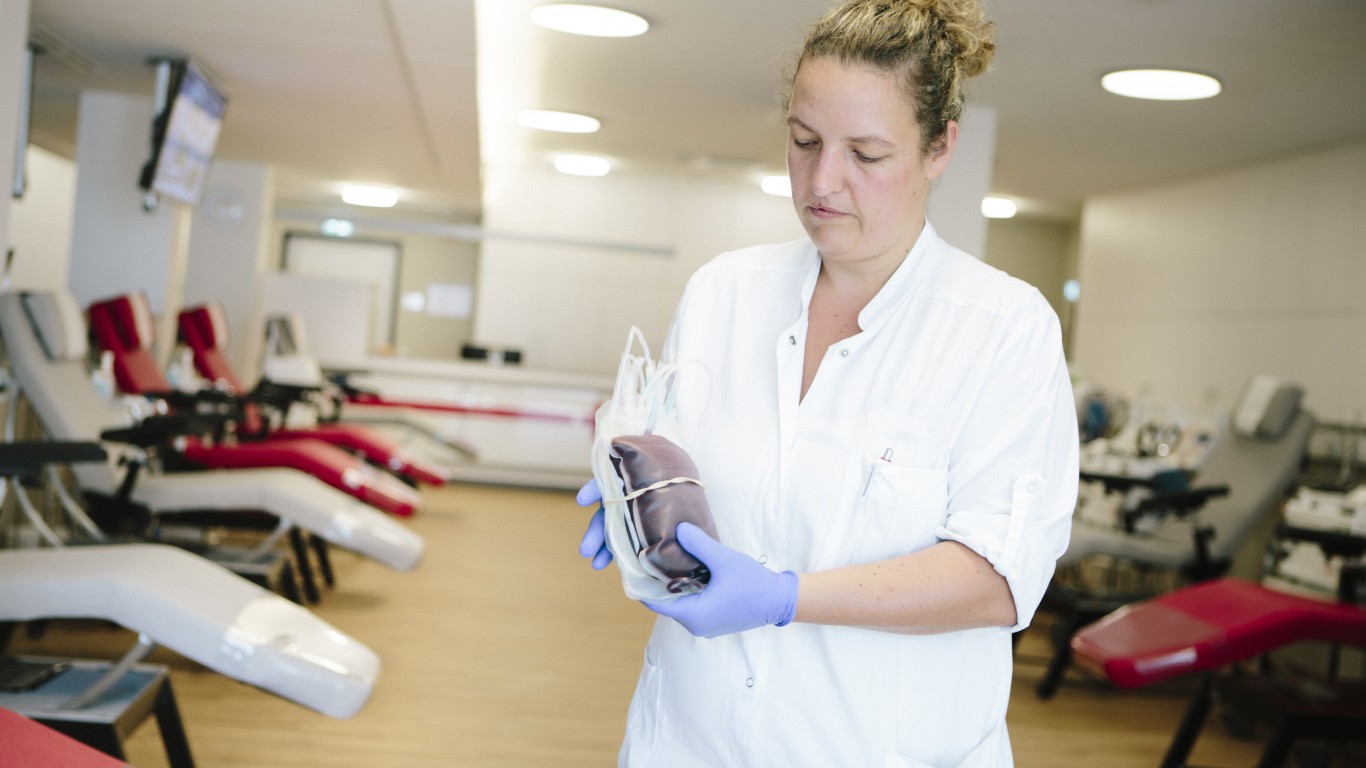
15. Utah
> Facilities per million residents: 10.44
> FDA-registered active blood centers: 33
> City with most blood center locations: Salt Lake City (8)
> Blood center with most locations Biomat USA, Inc. (13)
> Population: 3,161,105
[in-text-ad]
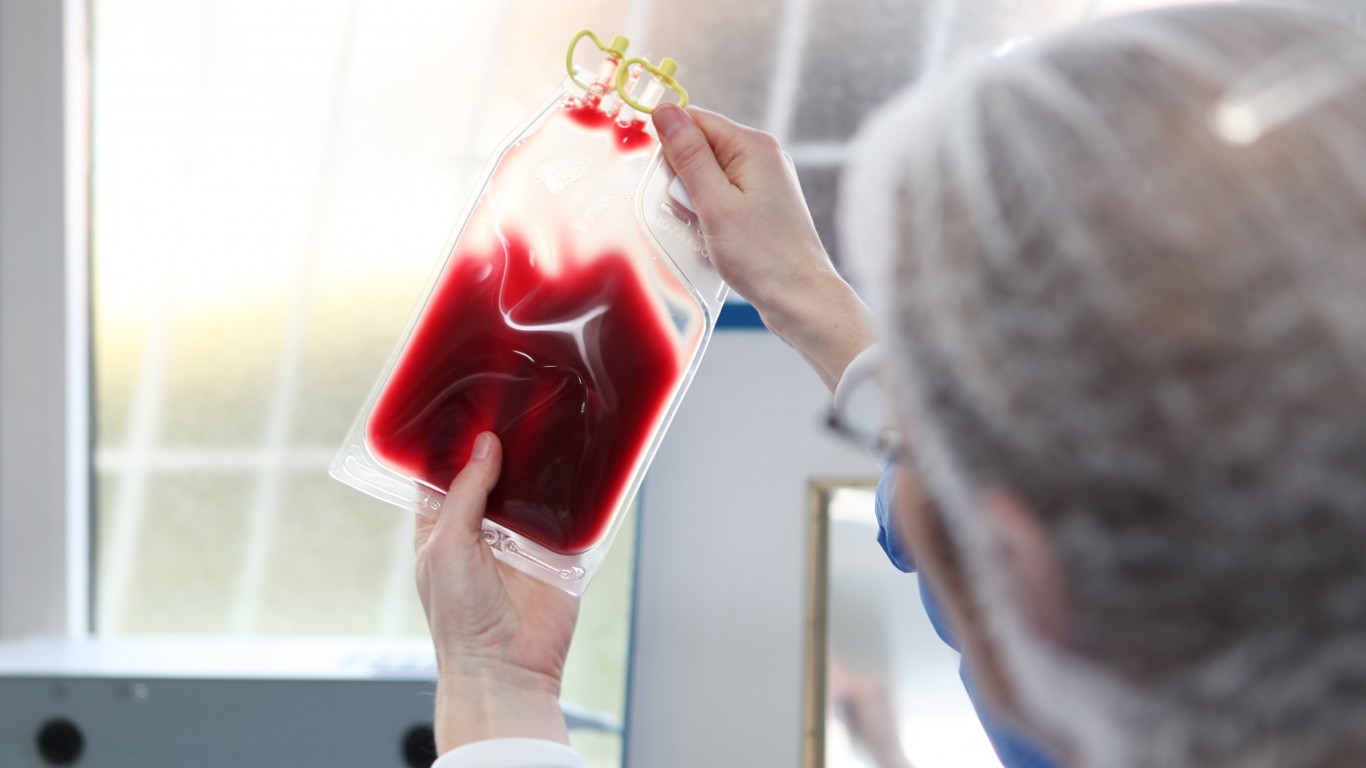
14. Indiana
> Facilities per million residents: 10.61
> FDA-registered active blood centers: 71
> City with most blood center locations: Indianapolis (19)
> Blood center with most locations CSL Plasma, Inc. (12)
> Population: 6,691,878
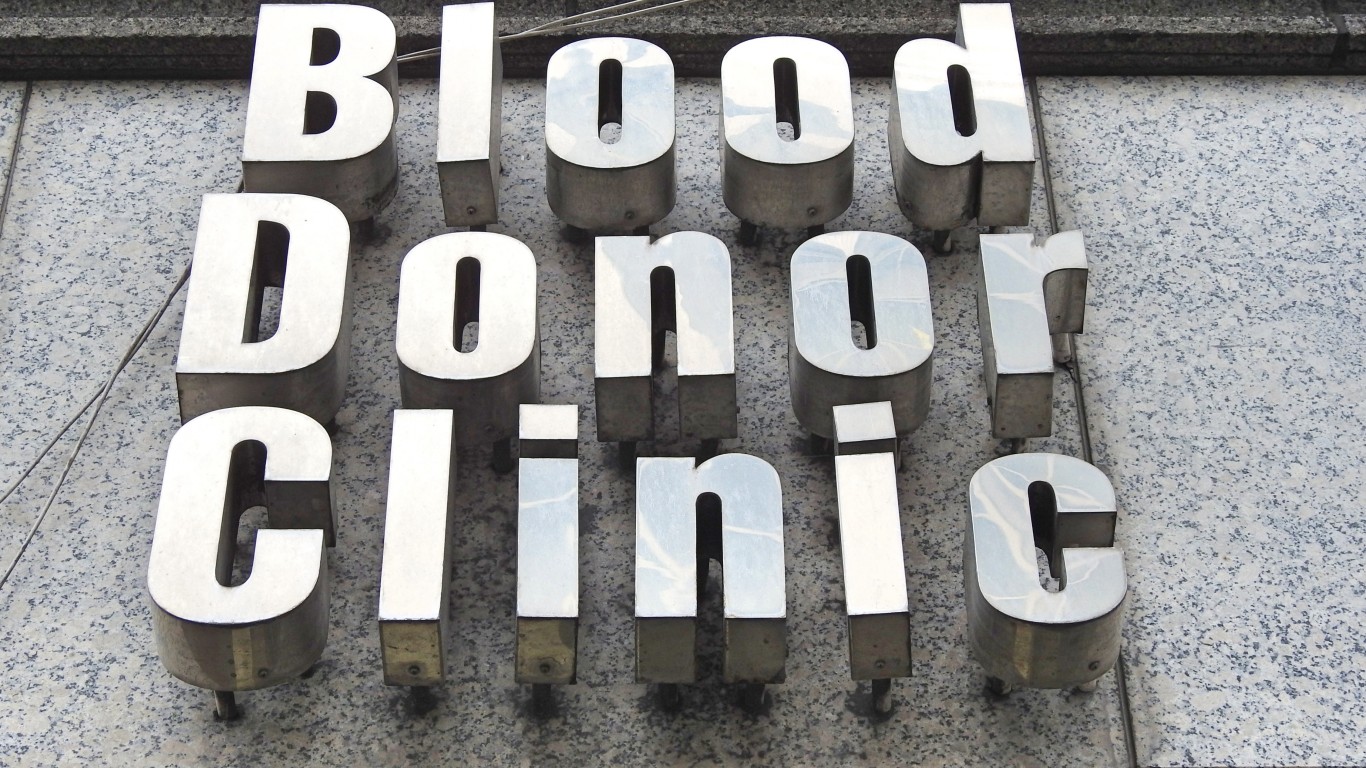
13. Florida
> Facilities per million residents: 10.70
> FDA-registered active blood centers: 228
> City with most blood center locations: Orlando (17)
> Blood center with most locations OneBlood, Inc. (85)
> Population: 21,299,325
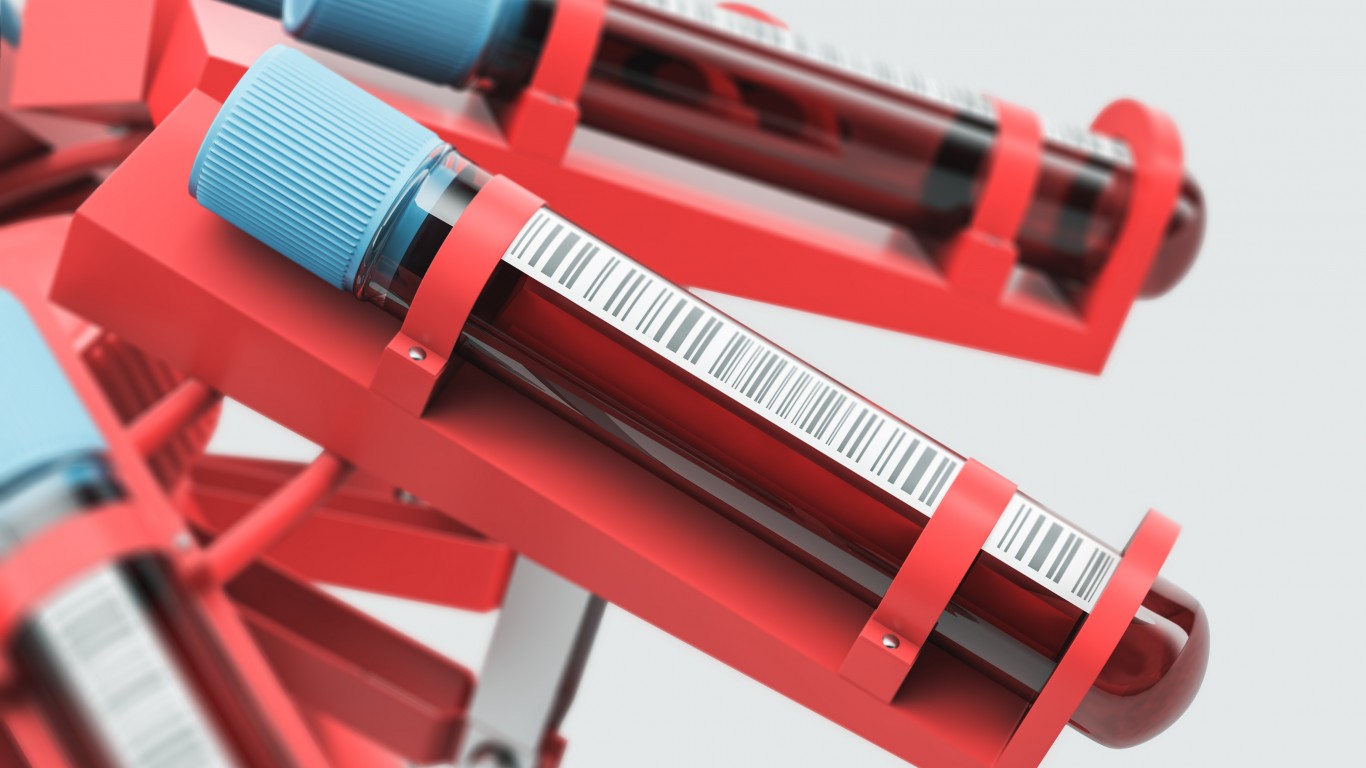
12. Alaska
> Facilities per million residents: 10.85
> FDA-registered active blood centers: 8
> City with most blood center locations: Anchirage (2)
> Blood center with most locations Blood Bank of Alaska, Inc. (5)
> Population: 737,438
[in-text-ad-2]
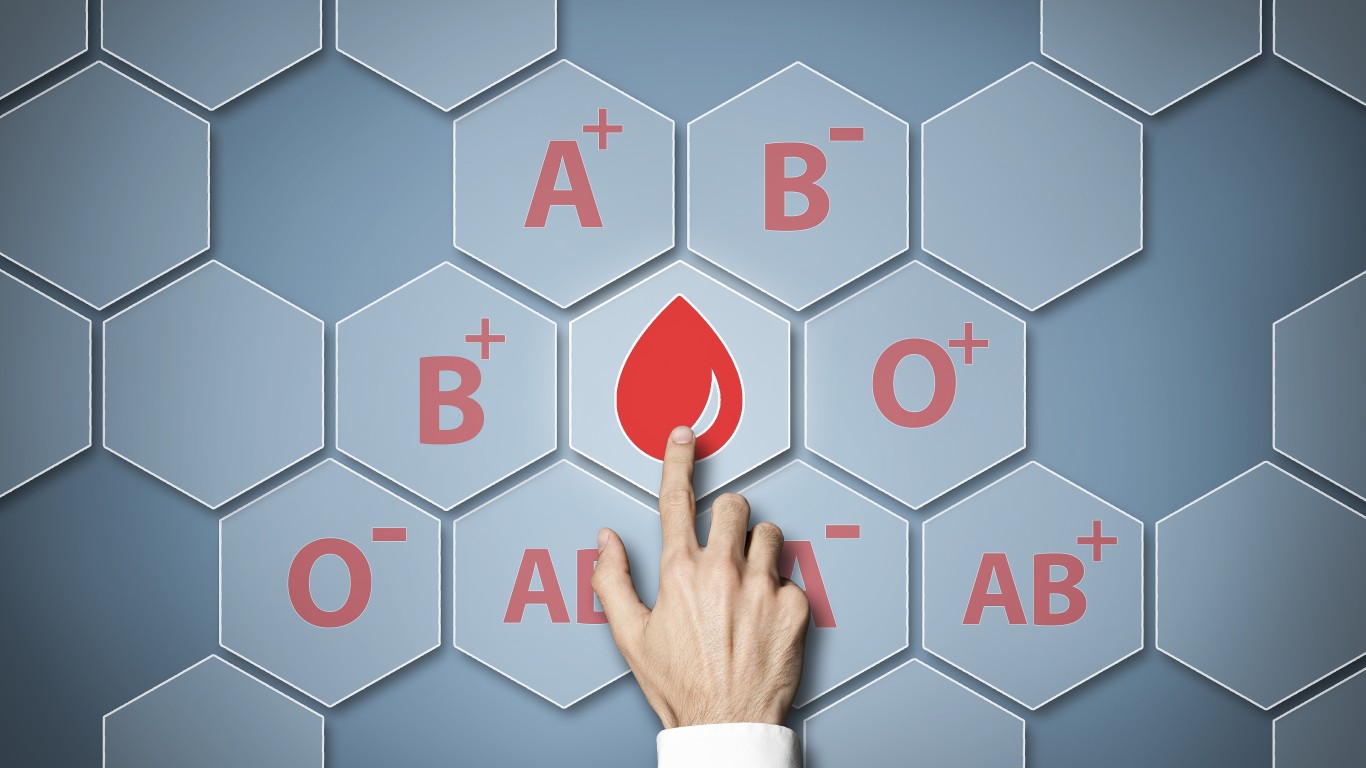
11. Maine
> Facilities per million residents: 11.21
> FDA-registered active blood centers: 15
> City with most blood center locations: Bangor (3) and Lewiston (3)
> Blood center with most locations American National Red Cross (3)
> Population: 1,338,404
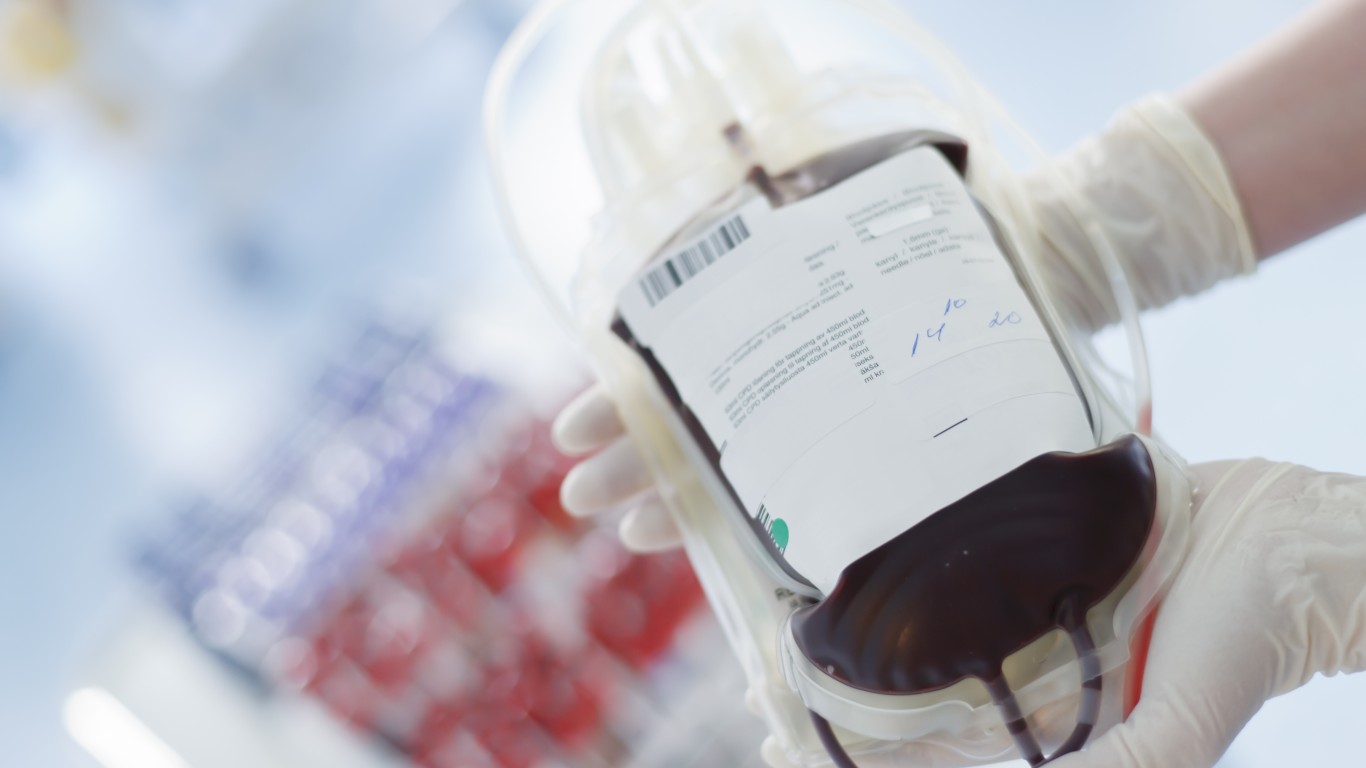
10. Tennessee
> Facilities per million residents: 11.67
> FDA-registered active blood centers: 79
> City with most blood center locations: Memphis (22)
> Blood center with most locations Interstate Blood Bank, Inc. (12)
> Population: 6,770,010
[in-text-ad]

9. Wisconsin
> Facilities per million residents: 11.70
> FDA-registered active blood centers: 68
> City with most blood center locations: Madison (10)
> Blood center with most locations BioLife Plasma Services L.P. (12) and Versiti Wisconsin, Inc. (12)
> Population: 5,813,568
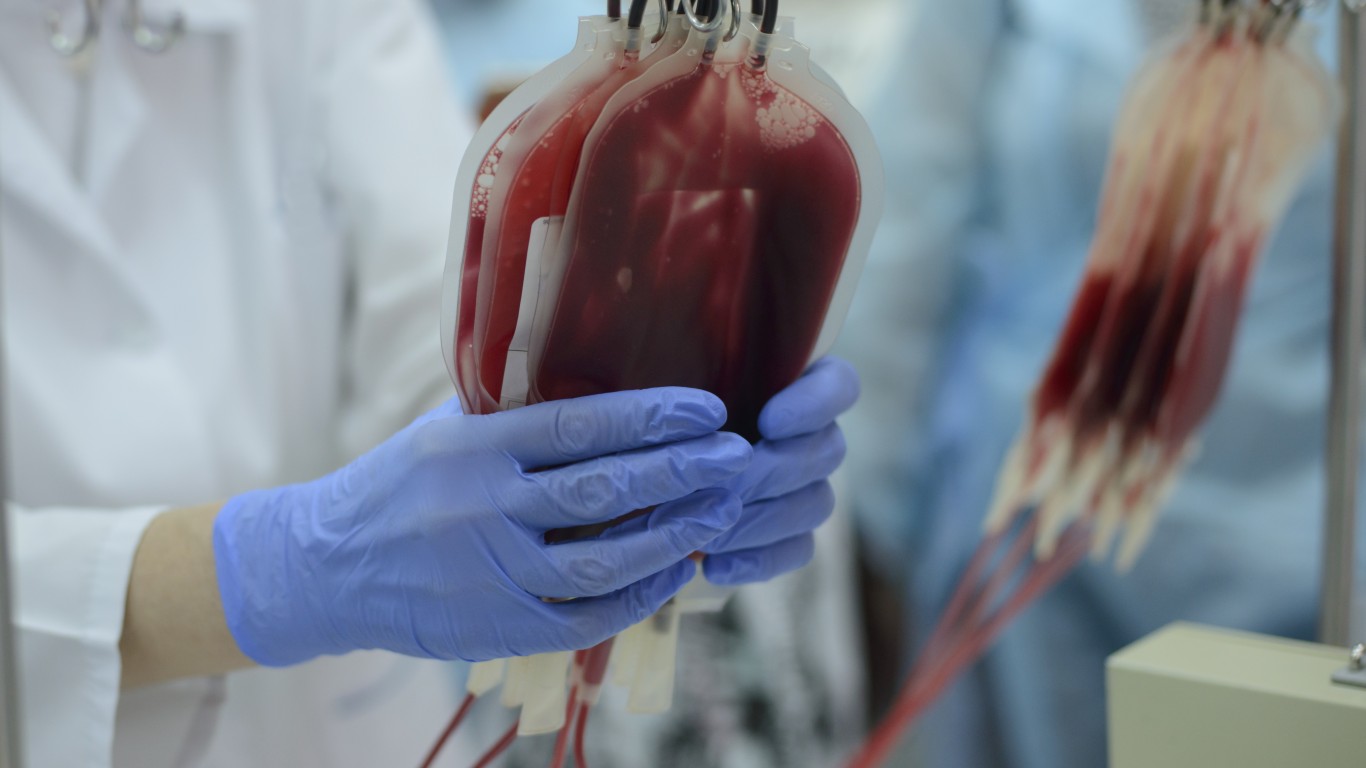
8. Nebraska
> Facilities per million residents: 11.92
> FDA-registered active blood centers: 23
> City with most blood center locations: Omaha (11)
> Blood center with most locations American National Red Cross (5)
> Population: 1,929,268
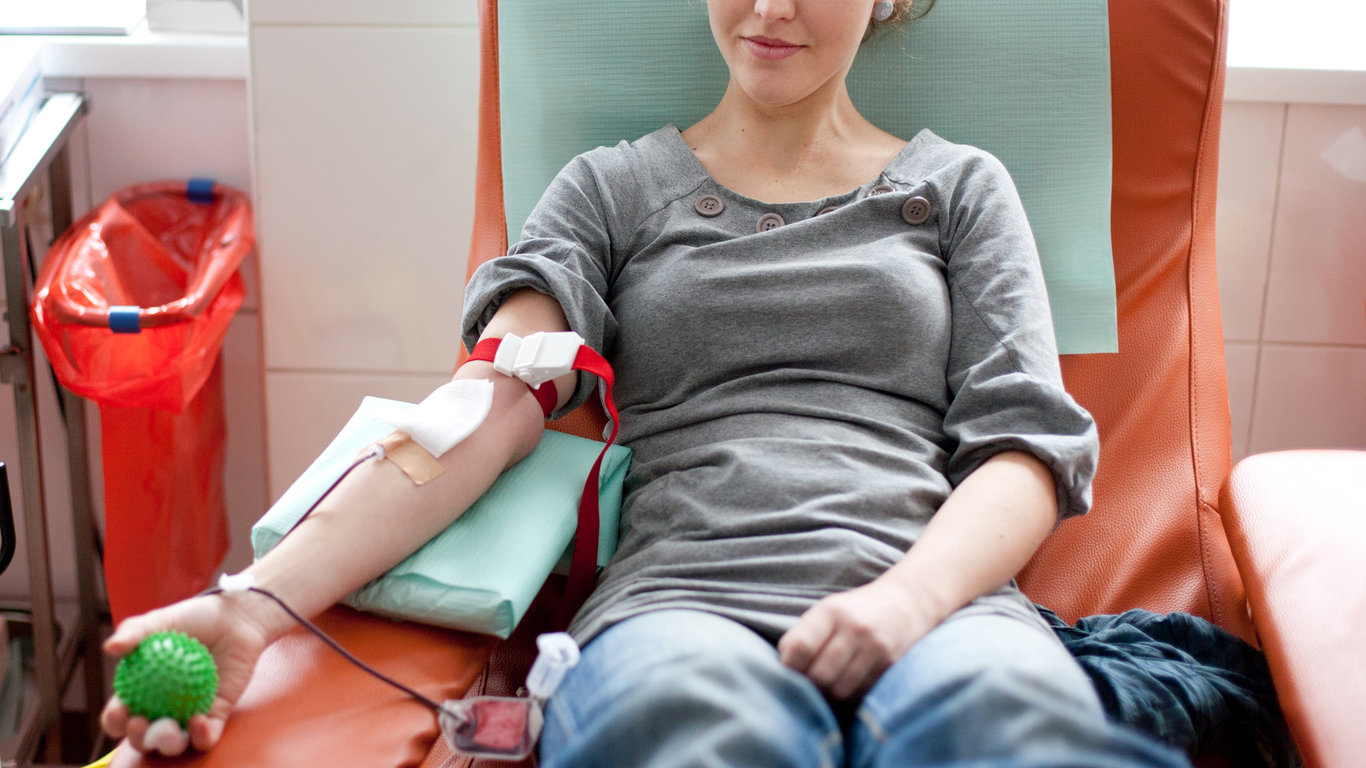
7. Wyoming
> Facilities per million residents: 13.85
> FDA-registered active blood centers: 8
> City with most blood center locations: Cheyenne (4)
> Blood center with most locations BioLife Plasma Services L.P. (3)
> Population: 577,737
[in-text-ad-2]
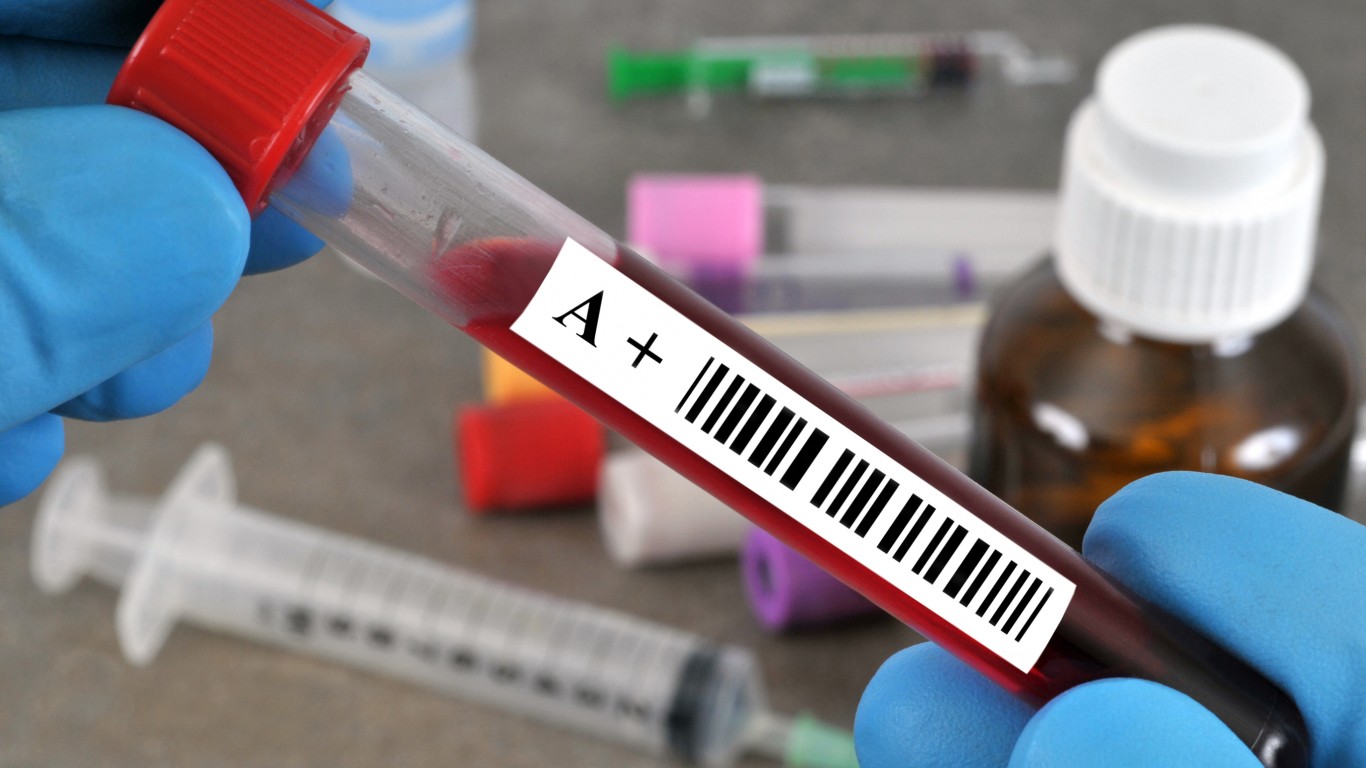
6. Montana
> Facilities per million residents: 14.12
> FDA-registered active blood centers: 15
> City with most blood center locations: Missoula (4)
> Blood center with most locations American National Red Cross (5)
> Population: 1,062,305
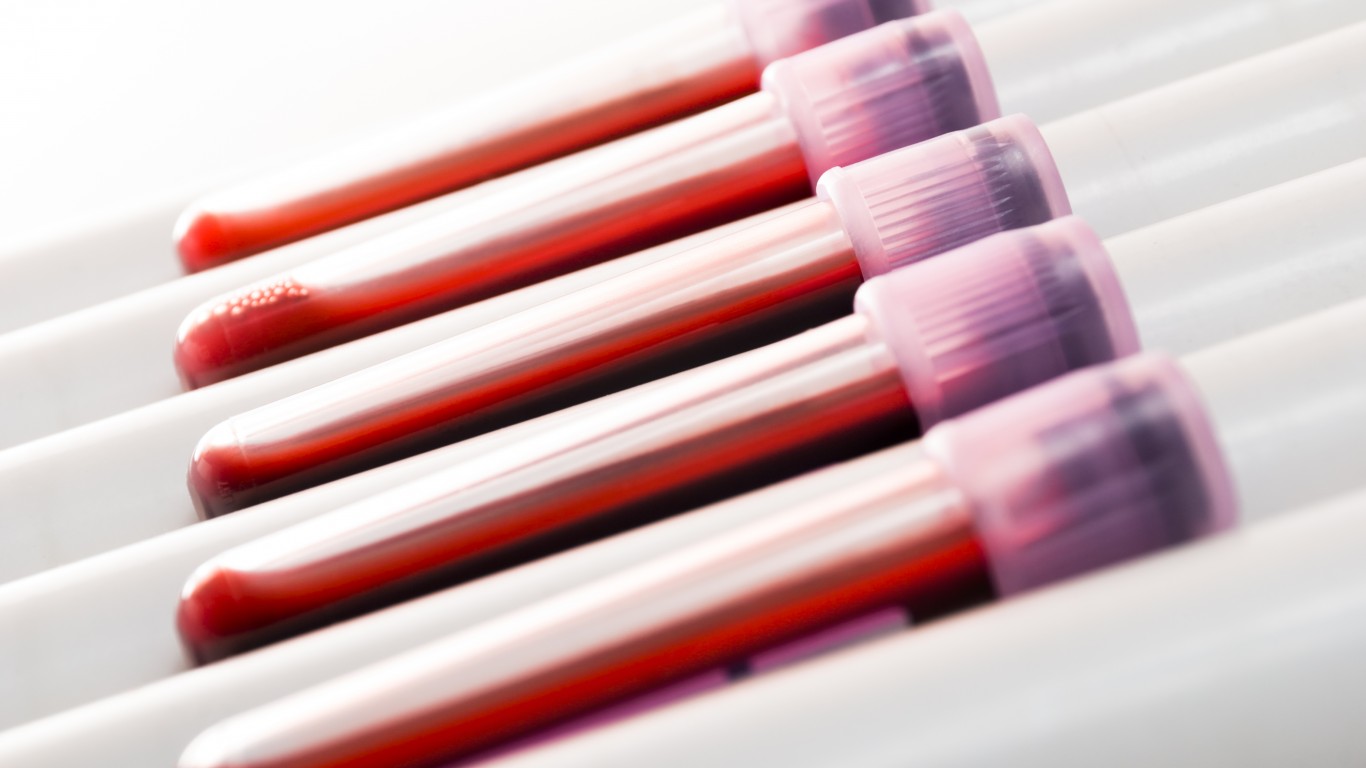
5. Idaho
> Facilities per million residents: 14.25
> FDA-registered active blood centers: 25
> City with most blood center locations: Boise (7)
> Blood center with most locations American National Red Cross (4), BioLife Plasma Services L.P. (4) and Biomat USA, Inc. (4)
> Population: 1,754,208
[in-text-ad]
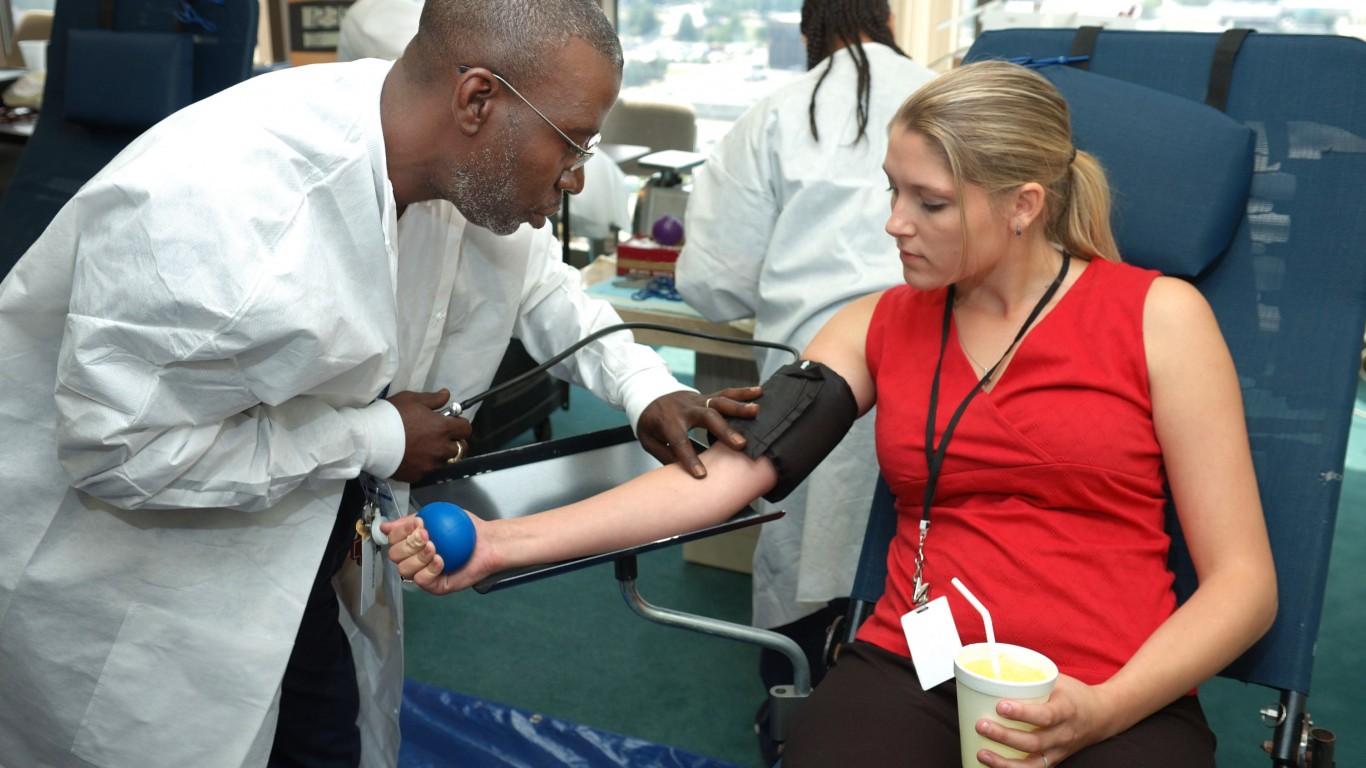
4. Iowa
> Facilities per million residents: 14.26
> FDA-registered active blood centers: 45
> City with most blood center locations: Des Moines (6)
> Blood center with most locations BioLife Plasma Services L.P. (10)
> Population: 3,156,145
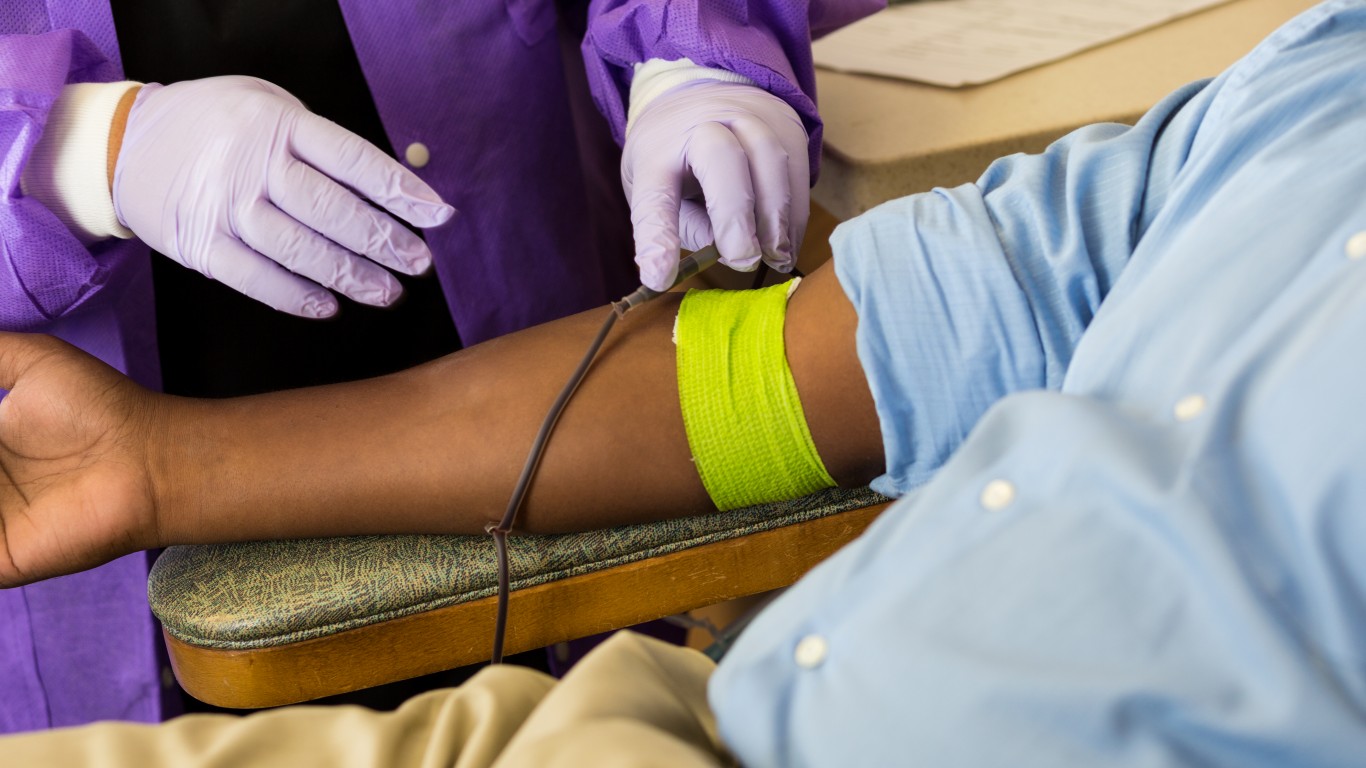
3. Louisiana
> Facilities per million residents: 15.02
> FDA-registered active blood centers: 70
> City with most blood center locations: Baton Rouge (9)
> Blood center with most locations The Blood Center (11)
> Population: 4,659,978
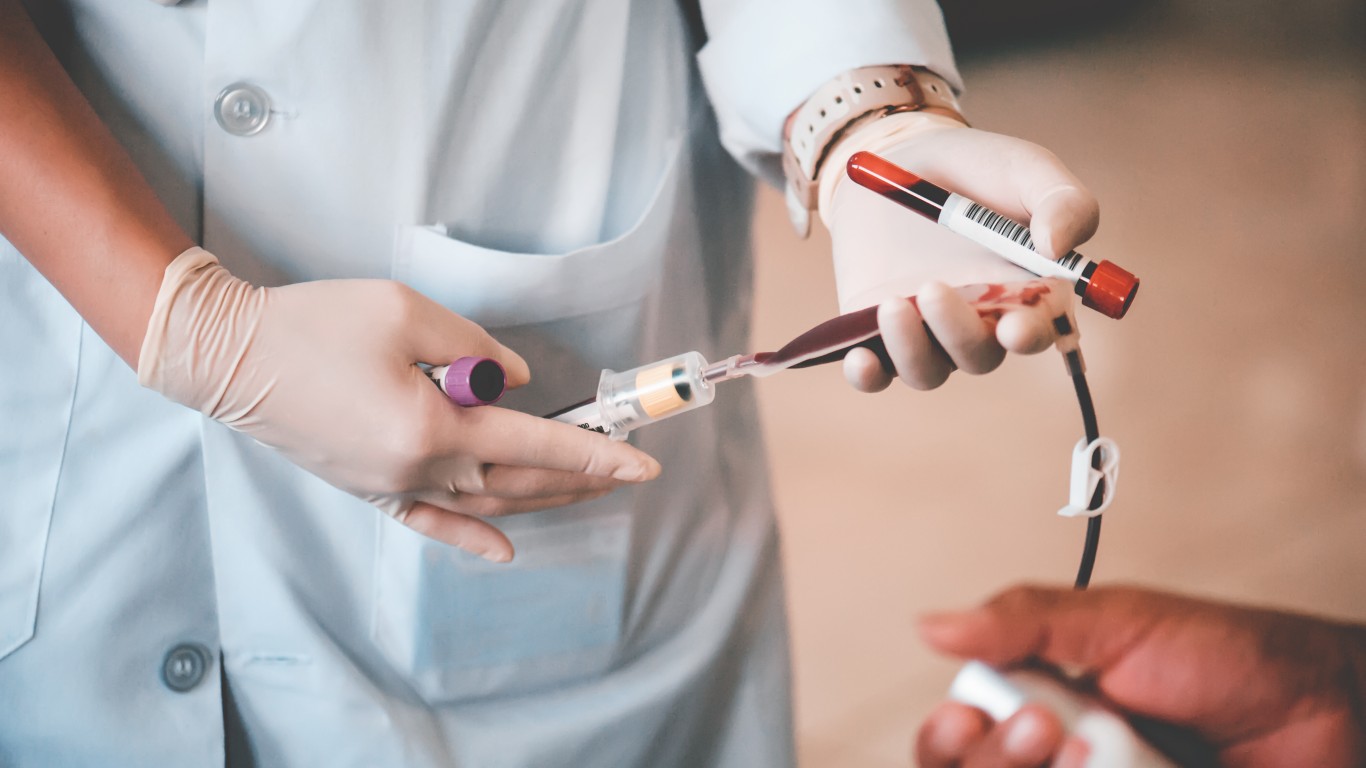
2. South Dakota
> Facilities per million residents: 15.87
> FDA-registered active blood centers: 14
> City with most blood center locations: Sioux Falls (4)
> Blood center with most locations VA Black Hills Health Care System (2) and Vitalant (2)
> Population: 882,235
[in-text-ad-2]
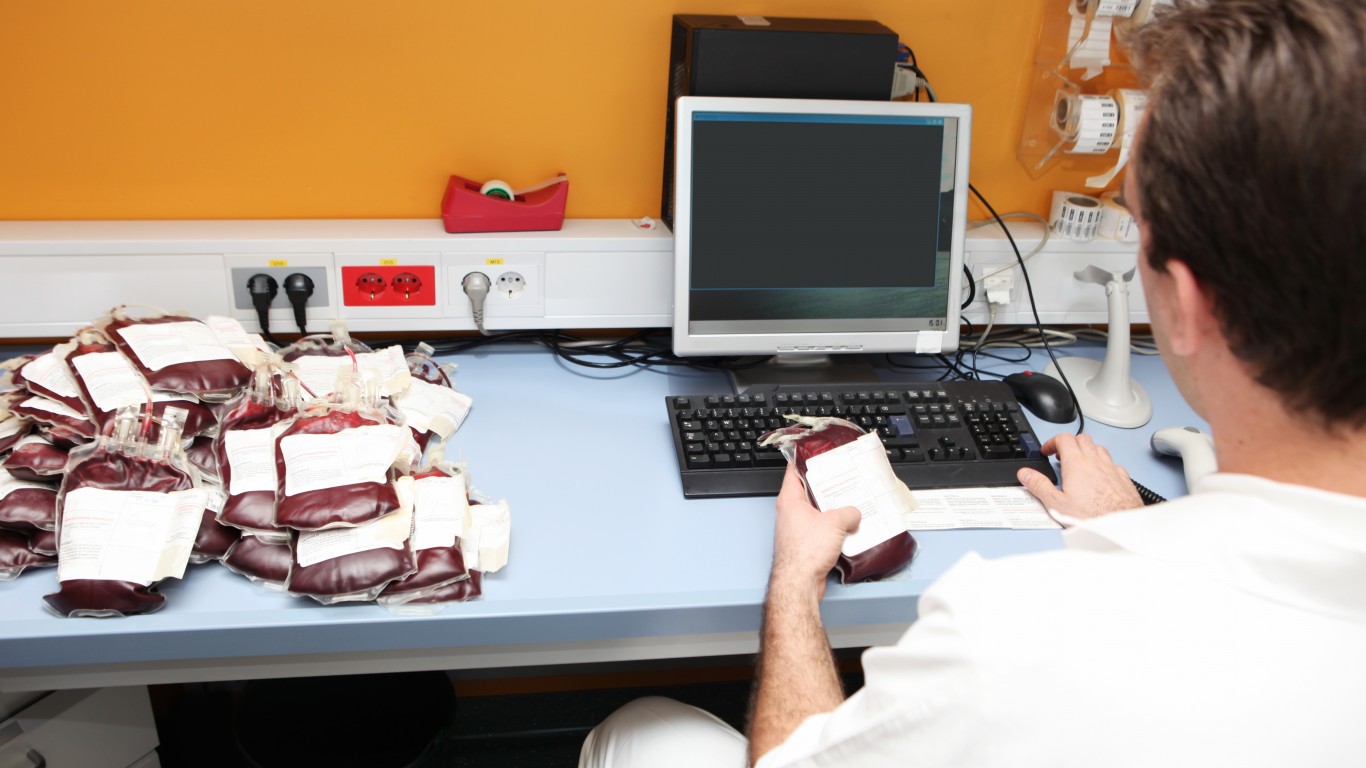
1. North Dakota
> Facilities per million residents: 19.73
> FDA-registered active blood centers: 15
> City with most blood center locations: Fargo (6)
> Blood center with most locations BioLife Plasma Services L.P. (4)
> Population: 760,077
The last few years made people forget how much banks and CD’s can pay. Meanwhile, interest rates have spiked and many can afford to pay you much more, but most are keeping yields low and hoping you won’t notice.
But there is good news. To win qualified customers, some accounts are paying almost 10x the national average! That’s an incredible way to keep your money safe and earn more at the same time. Our top pick for high yield savings accounts includes other benefits as well. You can earn up to 3.80% with a Checking & Savings Account today Sign up and get up to $300 with direct deposit. No account fees. FDIC Insured.
Click here to see how much more you could be earning on your savings today. It takes just a few minutes to open an account to make your money work for you.
Thank you for reading! Have some feedback for us?
Contact the 24/7 Wall St. editorial team.